Harrison Barnes' Legal Career Advice Podcast - Episode 87
This report examines the state of the American lateral law firm market in 2023. It reviews key trends and provides analysis of the current landscape across various aspects, including hiring activity, compensation, bonuses and benefits, relocation packages, and more. It is intended to provide insight into what to expect from the market going forward, so attorneys can make informed professional decisions.

Table of Contents
The State of the 2023 Legal Market: A Comprehensive Review of Practice Areas and Geographic Markets Affected by Recessions
The Impact of Recessions on The Legal Market
A Note About Suburbs Outside of Major Cities and the Demand for Legal ServicesRemote Working Conditions and Recessions in the Legal Market
What Happens to Attorney Salaries and Bonuses During Recessions
Protecting Your Career Against Recessions: Tips for Attorneys
Practice Areas Most Adversely Affected by Recessions
- General Corporate
- Corporate Investment Management
- Corporate-Mergers and Acquisitions
- Corporate-Private Equity
- Corporate-Securities and Capital Markets
- Corporate-Venture Capital
- Data Privacy
- Finance-General
- Finance-Banking
- Structured Finance
- Fintech & Blockchain
- Intellectual Property (IP)
How Economic Recessions Specifically Affect Trademark Law
1. Real Estate
Practice Areas Not Affected by Economic Conditions
- Criminal Law
- Estate Planning
- Environmental Law
- Family Law
- Health Law
- Immigration Law
- Probate Law
- Tax Law
- Antitrust
- Bankruptcy
- Consumer Protection Law
- Employee Benefits
- Labor and Employment
- Litigation
- Workers Compensation
Region and Practice Area Wise Graph
Major Legal Markets Least Affected by Recessions Interviews and Placements - Average of Growth by Region
Other States Likely to Remain Stable and be Unaffected by Legal Recessions
- Alabama
- Arizona
- Arkansas
- Connecticut
- Delaware
- Georgia
- Hawaii
- Idaho
- Indiana
- Kansas
- Kentucky
- Louisiana
- Maine
- Maryland
- Michigan
- Minnesota
- Mississippi
- New Hampshire
- New Jersey
Northern New Jersey
Southern New Jersey
- New Mexico
- Ohio
- Pennsylvania
- Rhode Island
- South Carolina
- Texas
- Utah
- Vermont
- Virginia
- Washington State
- West Virginia
- Wisconsin
- Wyoming
- Albany
- Ann Arbor
- Atlanta
- Austin
- Baltimore
- Boston
- Buffalo
- Charlotte
- Chicago
- Cincinnati
- Cleveland
- Columbia
- Dallas
- Grand Rapids
- Hartford
- Houston
- Kansas City
- Lansing, Michigan
- Las Vegas
- Los Angeles
- Madison
- Memphis
- Miami
- Milwaukee
- Minneapolis/St. Paul
- Nashville
- New Orleans
- New York City
- Newark
- Norfolk, Virginia
- Northern Virginia
- Northern California (San Francisco, Palo Alto, Oakland)
- North Carolina Research Triangle
- Oklahoma City
- Omaha
- Orange County, California
- Philadelphia
- Pittsburgh
- Portland
- Reno, NV
- Richmond, Virginia
- Rochester, NY
- San Antonio
- San Diego
- Seattle
- St. Louis, Missouri
- Syracuse, NY
- Virginia Beach
THE STATE OF THE 2023 LEGAL MARKET: A COMPREHENSIVE REVIEW OF PRACTICE AREAS AND GEOGRAPHIC MARKETS AFFECTED BY RECESSIONS
At BCG Attorney Search, there has been a slowdown in legal hiring. Based on the declining numbers of both interviews and placements, it appears that a recession has already begun. Here are what prominent figures and publications have to say on the matter:
JPMorgan CEO Jamie Dimon has been warning of an impending recession and recently predicted that the U.S. could enter a recession in the next six to nine months. Dimon cites inflation, Russia's invasion of Ukraine, and interest rate hikes as contributing factors.
President Biden doesn't think a recession is likely, though he admits it is a possibility. If it does happen, he believes it will be slight. Biden has pointed out that the U.S. is in a better position economically and politically than any other major country.
KPMG's latest CEO survey found that 86% of top executives believe there will be a recession in the next 12 months. However, most of those surveyed (60%) think it will be mild and short, and over 75% already have plans to deal with an economic slowdown. 71% of CEOs surveyed are optimistic about the global economy over the next three years.
Economist Nouriel Roubini, who earned the nickname "Dr. Doom" for correctly predicting the 2008 financial crisis, has warned of an impending recession for some time. He believes that the
U.S. will likely enter a recession in the coming six to nine months, and that it won’t be short or shallow. Roubini blames the high debt levels held by corporations and the government; he believes we're heading for a "stagflationary crisis."
Bloomberg Economics' probability model shows a 100% chance of a recession within the next 12 months, based on 13 different macroeconomic and financial indicators.
A recent Bank of America report warned that job growth could fall sharply next year, potentially leading to the loss of 175,000 jobs per month during certain parts of 2023. Federal Reserve Chair, Jerome Powell, also indicated that a failure to deal with inflation could lead to increased unemployment, potentially resulting in a loss of 1.3 million U.S. jobs. Economist Olivier Blanchard, former Chief Economist at the International Monetary Fund, has expressed concern that companies may slow their hiring or lay off employees if sales decline, which he believes is likely. This could also have an impact on law firms and the legal market.
Goldman Sachs has noted that the jobs-workers gap in the labor market - the difference between total labor demand (employment plus job openings) and total labor supply (the size of the labor force) - has fallen from a peak of nearly 6 million to just over 4 million. A decrease in job openings and an increase in the labor force have driven this decline. If the economy enters a recession, the jobs-workers gap could widen, increasing competition for legal jobs.
THE BCG ATTORNEY SEARCH LAW FIRM LAYOFF TRACKER
The BCG Attorney Search Law Firm Layoff Tracker is a tool that tracks and updates information on law firm layoffs in the United States. The tracker provides a comprehensive list of firms that have implemented layoffs, furloughs, and other cost-cutting measures in response to the economic downturn. It also includes information on the number of individuals affected by the layoffs and the practices or departments within the firms that have been affected. This tool is useful for those affected by the layoffs and the legal industry as a whole, as it provides insight into the impact of the economic downturn on the legal profession. The BCG Attorney Search Law Firm Layoff Tracker is updated regularly, providing the most current information on law firm layoffs.
Law Firm Layoff Tracker (as of January 2023)
| Firm | # Laid Off | Location | Type | Date | Severance | Healthcare |
| Strook | 9 | Unknown | Open | 01/90/23 | Unknown | Unknown |
| Goodwin | Unknown | Unknown | Open | 1/4/2023 | Unknown | Unknown |
| Cooley | 78 | Firmwide | Open | 11/30/2022 | Unknown | Unknown |
| Gunderson Dettmer | 30 | SF and NY | Stealth | 11/11/2022 | Unknown | Unknown |
| Cooley | Unknown | SF and NYC | Stealth | 11/8/2022 | Unknown | Unknown |
| Kirkland | 20+ | TX, LA and SLC | Stealth | 11/2/2022 | Several months | Unknown |
| Bryan Cave | 50 | Firmwide | Stealth | 10/9/2020 | Unknown | Unknown |
| Sheppard Mullin | Unknown | Firmwide | Stealth | 10/7/2020 | Unknown | Unknown |
| Seyfarth | Unknown | Firmwide | Stealth | 9/18/2020 | 2 months | Unknown |
| Winston & Strawn | 26-50 | Firmwide | Stealth | 9/14/2020 | 3 months | Unknown |
| Baker McKenzie | Unknown | Firmwide | Open | 9/2/2020 | Unknown | Unknown |
| Snell and Wilmer | Unknown | OC and LA | Stealth | 8/10/2020 | Unknown | Unknown |
| Miller Canfield | 44936 | Firmwide | Stealth | 7/10/2020 | Unknown | Unknown |
| Hughes Hubbard & Reed | Unknown | Firmwide | Open | 7/7/2020 | Unknown | Unknown |
| Fox Rothschild | 44936 | Firmwide | Stealth | 7/4/2020 | Unknown | Unknown |
| Katten Muchin | Unknown | Firmwide | Stealth | 6/30/2020 | 2 months | Unknown |
| Reed Smith | 45255 | London | Open | 6/1/2020 | Unknown | Unknown |
| Dorsey & Whitney | Unknown | Firmwide | Open | 5/20/2020 | Unknown | Unknown |
| Goodwin | 45255 | Firmwide | Stealth | 5/15/2020 | 3 months | 4.5 months |
| Nixon Peabody | Unknown | Firmwide | Open | 5/6/2020 | Unknown | Unknown |
| Vedder Price | Unknown | Firmwide | Open | 5/5/2020 | Unknown | Unknown |
| Saul Ewing | 45255 | Firmwide | Open | 4/30/2020 | Unknown | Unknown |
| Akerman | 26-50 | Firmwide | Open | 4/24/2020 | Unknown | Unknown |
| Husch Blackwell | Unknown | Firmwide | Stealth | 4/23/2020 | Unknown | Unknown |
| Dinsmore | Unknown | Firmwide | Open | 4/23/2020 | Unknown | Unknown |
| McDermott Will & Emery | Unknown | Firmwide | Open | 4/22/2020 | Unknown | Unknown |
| Taft Stettinius & Hollister | Unknown | Firmwide | Open | 4/21/2020 | Unknown | Unknown |
| Norton Rose | Unknown | Firmwide | Stealth | 4/16/2020 | Unknown | Unknown |
| Ogletree | Unknown | Texas | Stealth | 4/15/2020 | Unknown | Unknown |
| Greenspoon Marder | 44936 | Firmwide | Open | 4/15/2020 | Unknown | Unknown |
| Goldberg Segalla | Unknown | Firmwide | Open | 4/9/2020 | Unknown | Unknown |
| Womble Bond Dickinson | Unknown | Firmwide | Open | 3/30/2020 | Unknown | Unknown |
| Cahill Gordon | Unknown | Firmwide | Stealth | 1/18/2019 | 6 months | Unknown |
THE IMPACT OF RECESSIONS ON THE LEGAL MARKET
During economic prosperity, the demand for legal services is often high, and there may be a shortage of attorneys. This can lead to law firms catering to the needs of their associates and providing higher salaries, better benefits, and more favorable working conditions. Associates may also be more likely to negotiate for additional help or professional development opportunities. To understand which firms continue to thrive financially even during downturns, explore The World’s Largest Law Firms by Revenue in 2025.
However, during recessions or economic downturns, the legal market may become more competitive, and law firms may exert more control over associates' employment terms. Associates may accept lower salaries or less favorable working conditions to keep their jobs and may be unlikely to negotiate additional benefits or professional development opportunities. For a comprehensive look at current market trends shaping the legal industry, see The State of the Legal Market in 2025: Trends, Challenges, and Career Strategies.
Recessions can also impact the legal market by decreasing the demand for legal services as law firms begin cost-cutting measures. For context on how top U.S. firms perform under different economic conditions, see America’s 100 Largest Law Firms Ranked by Revenue. This can result in job losses for attorneys or make it more difficult for them to find new employment opportunities. To prepare for these possibilities, attorneys may benefit from building diverse skills, staying current on industry trends, and maintaining a strong network of professional contacts.
Some in-demand areas, such as litigation, privacy, data security, intellectual property, employee benefits, and tax, may still see steady hiring. For an analysis of fast-growing practice areas expected to remain resilient in changing markets, explore Exploring the Future of Law: Top High-Growth Legal Practice Areas for 2023. In contrast, countercyclical or specialized practice areas like labor and employment, employee benefits, and antitrust may need help finding qualified candidates. There are also regional differences, with legal markets in California, Washington, D.C., Colorado, Florida, and Texas experiencing more modest effects from the economic downturn.
Partners with portable books of business may still be in high demand, as they are considered valuable assets to law firms. Additionally, moving during an economic downturn can be beneficial, as law firms may be more likely to fill existing needs rather than speculative future ones. For attorneys exploring new opportunities during uncertain times, read Attorney Lateral Movement: A Comprehensive Guide to Practice Area and Market Transitions.
Technology can also impact the legal market, with the adoption of artificial intelligence and other technological advances potentially leading to changes in the types of jobs available and the skills required to succeed in the field. As the legal market navigates the current economic downturn, attorneys must stay informed and flexible to position themselves for success in the changing landscape. While there may be challenges ahead, there are also opportunities for those who are prepared and proactive.
A NOTE ABOUT SUBURBS OUTSIDE OF MAJOR CITIES AND THE DEMAND FOR LEGAL SERVICES
The legal markets in the suburbs outside of major cities tend to be more insulated from economic downturns than those in major cities; the suburban legal markets are often less reliant on the financial and corporate industries, which tend to be more vulnerable to economic fluctuations. Instead, they often cater to smaller, local businesses and individuals less affected by economic downturns.
In times of economic uncertainty, clients may be more cost-conscious and willing to consider law firms outside the major cities to save on legal fees. Additionally, suburban law firms may have a more personalized and localized approach to client service, which can be appealing to clients looking for more individualized attention.
However, it is essential to note that suburban law firms may sometimes get less work during recessions due to their smaller size and fewer clients. Major city firms have more extensive and diverse client bases, which can provide a steadier stream of work during economic downturns. They may also have a larger pool of attorneys to draw from, making it easier for city law firms to handle an influx of work during a recession.
Overall, the legal markets in the suburbs outside major cities tend to fare better in recessions than those in major cities. Still, levels of work will vary. Attorneys in these markets need to be proactive in marketing their services and building relationships with clients to secure steady work during economic downturns.
REMOTE WORKING CONDITIONS AND RECESSIONS IN THE LEGAL MARKET
The COVID-19 pandemic led to the widespread adoption of remote and hybrid work arrangements in many industries, including the legal field. These arrangements allowed law firms to provide attorneys more flexibility regarding where and when they work.
However, as economic conditions deteriorate, these arrangements may be threatened. Law firms may return to traditional office-based working arrangements to cut costs or increase productivity. For example, in 2013, Yahoo CEO Marissa Mayer announced that all employees would be required to return to the office, citing a need for "face-to-face interaction and collaboration." This decision was met with criticism from some employees and ultimately did not lead to the increase in productivity that Mayer had hoped for.
Similarly, law firms may revert to traditional working arrangements to cut costs or increase productivity during difficult economic times. This may require attorneys to return to the office full-time or adopt a more rigid schedule for remote work. These changes may be driven by a desire to reduce expenses related to remote work, such as the cost of providing employees
It's essential for attorneys to be aware of these potential changes and to be prepared to adapt to new working arrangements if necessary. While remote and hybrid arrangements have proven to be successful for many businesses, they may only be sustainable in some situations, particularly during times of economic downturn.
WHAT HAPPENS TO ATTORNEY SALARIES AND BONUSES DURING RECESSIONS
Law firms typically pay their attorneys through a combination of salaries and bonuses. For clarity on how firm hierarchy and compensation levels differ, see What Do Law Firm Titles Mean: Of Counsel, Non-Equity Partner, Equity Partner Explained. During economic recessions, law firms may be forced to adjust pay structures to stay financially viable. During boom economies, law firms may raise salaries and bonuses.
During economic recessions, law firms may experience a decline in demand for their services and a decrease in profitability. As a result, they may need to reduce costs to stay afloat. They may cut salaries and bonuses for their attorneys or decide to lay off attorneys or implement hiring freezes to reduce their overall headcount and costs.
While it is common for law firms to reduce salaries and bonuses during economic recessions, the extent of these cuts can vary. Some firms may implement modest cuts, while others may implement more significant amounts. In some cases, law firms may also negotiate salary reductions with their attorneys on a case-by-case basis.
During boom economies, law firms may experience an increase in demand for their services and a corresponding increase in profitability. With more financial flexibility, they may offer higher salaries and bonuses to attorneys. In some cases, law firms may choose to hire additional attorneys or increase their overall headcount. For a detailed overview of the most lucrative legal roles and their earning potential, explore The Highest-Paid Attorney Jobs: A Complete Guide to Maximum Legal Earnings in 2025.
It is worth noting that the impact of economic recessions on law firm pay structures can vary depending on the specific practice area and the firm's location. For example, law firms specializing in transactional work (such as mergers and acquisitions) may be less affected by economic recessions than firms specializing in litigation, as the demand for transactional work may be more stable. Similarly, law firms in specific geographic regions may be more affected by economic recessions than firms in other regions.
PROTECTING YOUR CAREER AGAINST RECESSIONS: TIPS FOR ATTORNEYS
As the potential for a recession in 2023 looms, it's essential for attorneys to take steps to protect their careers and financial stability. How can attorneys prepare for potential job losses?
Sign up for LawCrossing.com to monitor the legal market: LawCrossing is a comprehensive job search site for attorneys, paralegals, and other legal professionals. By signing up for this service,
Keep your resume updated on BCG Attorney Search: BCG Attorney Search is a leading legal recruitment firm that specializes in placing attorneys with top law firms. Keeping your resume updated on their site assures that you are aware of any legal positions that may be a good fit for you. For actionable resume and interview strategies to stay competitive during a downturn, see Unlocking Your Legal Career Potential: Comprehensive Guide to Mastering Interviews and Crafting Winning Resumes for Attorneys.
Prioritize your emergency fund: Having an emergency fund with at least three to six months' worth of living expenses can provide a financial cushion if you are laid off. This money should be kept in an accessible savings account to give you time to look for a new job without having to take on debt or sell investments. For a deeper dive into creating a standout attorney resume, read A Complete Guide to Writing an Attorney Resume: Tips, Advice, and the Correct Format.
Make a plan: It's essential to have a plan in place if you are laid off. Think about how you will apply for new jobs, which skills you may need to acquire, and who can help you in your job search. Considering a career change? Know the steps to make that a reality. For a full roadmap on career mobility and alternative paths in the legal profession, see The Complete Attorney Career Guide: Navigating Legal Career Paths, Bar Admissions and Lateral Moves.
Reconnect with your network: Professional connections can be invaluable resources during a job search. If you've lost touch with some of your contacts during the pandemic, now is an excellent time to reach out and reconnect. This can help you build a strong network of people who can support you in your career goals.
PRACTICE AREAS MOST ADVERSELY AFFECTED BY RECESSIONS
1 .GENERAL CORPORATE
The demand for Corporate legal services tends to be cyclical and is often linked to economic conditions.During economic booms, demand may increase as companies look to expand and take advantage of growth opportunities.
During economic downturns, demand may decrease as companies focus on survival rather than growth.
Changes in the volume of corporate transactions can impact demand for corporate legal services.
During economic booms, corporate transactions may increase, leading to more work for a corporate attorney.
During economic downturns, corporate transactions may decrease, leading to less work for a corporate attorney.
Changes in the types of completed transactions can also impact demand for Corporate legal services.
During economic booms, there may be greater demand for legal services related to expansion and growth (e.g., financing, raising capital).
Changes in regulatory environments can also impact demand for corporate legal services.
During economic booms, there may be less pressure on businesses to comply with regulatory requirements, leading to less demand for legal services related to regulatory compliance.
During economic downturns, there may be more pressure on businesses to comply with regulatory requirements, leading to more demand for legal services related to regulatory compliance.

2. CORPORATE INVESTMENT MANAGEMENT
Investment Management is a legal practice area involving management of investment portfolios and investing capital in various asset classes, including stocks, bonds, and other financial instruments.
Unfortunately, economic recessions often negatively impact this practice area as follows:
Economic conditions: During economic downturns, the demand for Investment Management services tends to decline as investors become more risk-averse and less willing to invest in the stock market or other securities. This is especially true for investors concerned about financial market stability or
long-term economic growth prospects. As a result, the volume of assets managed by investment management firms tends to decrease during economic recessions.
Decreased value of investments: The importance of assets may also decrease during economic recessions, as was the case during the global financial crisis of 2008-2009. This decrease in weight can affect the profitability of investment management firms and lead to layoffs or reduced job opportunities in the investment management legal practice area.
There is evidence that the Investment Management legal practice area is negatively affected by economic recessions. During the global financial crisis of 2008-2009, the demand for Investment Management lawyers declined as the volume of assets managed by investment management firms decreased, and the value of investments decreased. This decline negatively impacted jobs in the Investment Management legal practice area, as many firms experienced layoffs or reduced hiring.
3. CORPORATE-MERGERS AND ACQUISITIONS
Mergers and acquisitions (M&A) is a legal practice area involving businesses' mergers or acquisitions, including due diligence, financing, and regulatory compliance. Unfortunately, during economic recessions, M&A activity tends to decrease. According to Refinitiv’s data, M&A activity was down 10% year-over-year . Reasons include:
Economic conditions: During times of economic downturns, businesses may hesitate to engage in M&A transactions due to financial stability concerns and uncertainty about the future. This is especially true for companies that are struggling financially and want to preserve capital and minimize risk.
Access to financing: M&A rely on financing, which may be limited during economic recessions as banks and other financial institutions become more risk-averse and less likely to lend money. This can make it difficult for businesses to secure financing for M&A transactions.
There is evidence that M&A activity declines during economic recessions. During the global financial crisis of 2008-2009 and the dot-com crash of the early 2000s, M&A activity decreased due to financial stability concerns and reduced access to financing.
The impact of economic recessions on M&A activity can also indirectly affect jobs in the M&A legal practice area. The demand for M&A lawyers may decline as the number of M&A transactions decreases, leading to layoffs or reduced job opportunities.
4. CORPORATE-PRIVATE EQUITY
Private Equity is a legal practice dealing with issues related to capital investment in established businesses that are not publicly traded on stock exchanges. During an economic recession, the Private Equity legal practice area is often negatively affected:
Demand for private equity investment tends to decline as investors become more risk-averse and less willing to invest in established businesses.
The value of investments may decrease as investors become concerned about the financial markets' stability and the recession's impact on businesses.
This decrease in value can affect the profitability of private equity firms and lead to layoffs or reduced job opportunities in the private equity legal practice area.
During the global financial crisis of 2008-2009, the demand for Private Equity lawyers declined as the volume of private equity investments decreased and the value of assets decreased. This demand decline impacted private equity legal practice jobs, as many firms experienced layoffs or reduced hiring.
5. Corporate-Securities And Capital Markets
The Securities and Capital Markets legal practice area involves issues related to issuing and trading securities, such as stocks, bonds, and other financial instruments. During economic recessions, this legal practice area is often negatively affected as the demand for securities declines and the value of securities may decrease.
According to Firm Prospects, a law firm and attorney analytics company, hiring for capital markets practices at top law firms has declined by 25-33% since the year 2021. These firms engaged 34 partners and 117 associates in capital markets practices during the first half of 2022, compared to 45 partners and 176 associates during the same period in 2021. Many top law firms rely on deal-making as their
The slowdown is expected to affect law firms' financial performance, but it may also provide a chance for lawyers to return to a more sustainable workload. During boom times, the hectic pace of work had raised concerns about burnout among associates, who were offered bonuses and increases to work long hours. The slowdown in demand for IPO attorneys is not limited to the United States, as not one law firm has advised on over 30 IPOs globally during the first half of 2022. In the same period in 2021, 10 firms had reached that threshold.
There are a few reasons why the Securities and Capital Markets legal practice area is negatively affected by economic recessions:
Economic conditions: During economic downturns, the demand for securities tends to decline as investors become more risk-averse and less willing to invest in the stock market or other securities. This is especially true for investors concerned about financial market stability or long-term economic growth prospects. As a result, the volume of securities traded tends to decrease during economic recessions.
Decreased value of securities: Securities may also decrease during economic recessions, as was the case during the global financial crisis of 2008-2009. This decrease in value can affect the profitability of securities firms and lead to layoffs or reduced job opportunities in the securities and capital markets legal practice area.
There is evidence that the Securities and Capital Markets legal practice area is negatively impacted by economic recessions. During the global financial crisis of 2008-2009, the demand for Securities and Capital Markets lawyers declined as the volume and value of securities traded decreased, leading to many firms experiencing layoffs or reduced hiring.
6.CORPORATE-VENTURE CAPITAL
Venture Capital is a legal practice area that involves capital investment in the early stages of a business or startups. During economic recessions, this legal practice area is often negatively affected as the demand for venture capital investment declines and the value of investments may decrease.
There are a few reasons why the Venture Capital legal practice area is negatively affected by economic recessions:
Economic conditions: During times of economic downturn, the demand for venture capital investment tends to decline as investors become more risk-averse and less willing to invest in early-stage or startup businesses. This is especially true for investors concerned about financial market stability or long-term economic growth prospects. As a result, the volume of venture capital investments tends to decrease during economic recessions.
Decreased value of investments: The value of assets may also decrease during economic recessions, as was the case during the global financial crisis of 2008-2009. This decrease in value can affect the profitability of venture capital firms and lead to layoffs or reduced job opportunities in the venture capital legal practice area.
There is evidence that the Venture Capital legal practice area is negatively affected by economic recessions. During the global financial crisis of 2008-2009, the demand for Venture Capital lawyers declined as the volume of venture capital investments decreased and the value of investments decreased. This demand decline had a negative impact on jobs in this practice area, as many firms experienced layoffs or reduced hiring.
7. DATA PRIVACY
Data Privacy is a legal practice involving personal data, including data protection, security, and privacy laws. During economic recessions, the Data Privacy legal practice area is often negatively affected as the demand for data privacy products and services tends to decline and the profitability of data privacy companies may decrease.
There are a few reasons why this area is negatively affected by economic recessions:
Economic conditions: During times of economic downturns, the demand for data privacy products and services tends to decline as businesses and individuals become more risk-averse and less willing to invest in new technologies. This is especially true for companies and individuals concerned about the financial markets’ stability or long-term economic growth prospects. Thus, the volume of data privacy products and services sold tends to decrease during economic recessions.
Decreased profitability of data privacy companies: The profitability of data privacy companies may also decrease during economic recessions, as was the case during the global financial crisis of 2008-2009. This decrease in profitability can affect the demand for Data Privacy lawyers and lead to layoffs or reduced job opportunities in this field.
There still needs to be more evidence available on how the Data Privacy legal practice area is affected by economic recessions; the field is relatively new, and there has not been a significant recession since the emergence of Data Privacy as a legal practice area. However, based on known impacts on other legal practice areas due to recessions, it is likely that the Data Privacy legal practice area will also suffer.

8.FINANCE-GENERAL
Finance is a legal practice area that involves financing businesses and individuals, including lending, borrowing, and investment. During economic recessions, the finance legal practice area is often negatively impacted as the demand for financing declines and the availability of financing may become limited. Reasons include:Economic conditions: During times of economic downturns, the demand for financing tends to decline as businesses and individuals become more risk-averse and less willing to take on additional debt. This is especially true for companies and individuals concerned about the financial markets’ stability or
Limited availability of financing: The availability of financing may also be limited during economic recessions, as was the case during the global financial crisis of 2008-2009. These limitations on financing can affect the ability of businesses and individuals to secure the financing they need and can lead to reduced demand for Finance lawyers.
There is evidence that the Finance legal practice area is negatively affected by economic recessions. During the global financial crisis of 2008-2009, demand for Finance lawyers declined as the volume of financing provided by financial institutions decreased along with the availability of financing. This demand decline had a negative impact on jobs in the Finance legal practice area, as many firms experienced layoffs or reduced hiring.
- For a case study on a firm actively embracing these trends, see Greenspoon Marder LLP: Embracing Diversity and Empowering Legal Professionals.
9.FINANCE-BANKING
Banking is a legal practice area involving the operation of banks and other financial institutions, including lending, borrowing, and relevant regulations. Economic recessions often negatively impact this area, as the demand for banking services declines, and the profitability of banks may decrease. Reasons include:
Economic conditions: During times of economic downturns, the demand for banking services tends to decline as businesses and individuals become more risk-averse and less willing to take on additional debt. This is especially true for businesses and individuals concerned about the financial markets’ stability or long-term economic growth prospects. The volume of lending and borrowing by banks tends to decrease during economic recessions.
Decreased profitability of banks: Economic recessions can also lead to decreased profitability for banks, leading to layoffs or reduced job opportunities in the Banking legal practice area. Evidence shows that the Banking legal practice area is negatively affected by economic recessions. During the global financial crisis of 2008-2009, the demand for these lawyers declined as the volume of lending and borrowing by banks decreased along with their profitability. This decline had a negative impact on jobs, as many firms experienced layoffs or reduced hiring.
10.STRUCTURED FINANCE
Structured Finance is a legal practice specializing in creating and issuing complex financial instruments, such as securities and derivatives, which are used to transfer risk or raise capital. During economic recessions, the Structured Finance legal practice area may be negatively affected in the following ways:
Decline in demand for structured finance products: Economic recessions often lead to a decline in the demand for structured finance products, as investors become more risk-averse and less willing to invest in complex financial instruments. This can be especially true for investors concerned about the financial markets' stability or long-term economic growth prospects. Thus, the volume of structured finance products issued tends to decrease during an economic recession.
Decrease in the value of structured finance products: The value of structured finance products may also decrease during economic recessions, as investors become concerned about the financial markets' stability along with the recession's impact on businesses. This decrease in value can affect the profitability of Structured Finance firms, leading to layoffs or reduced job opportunities in this area.
11. Fintech & Blockchain
The Fintech & Blockchain legal practice area specializes in providing tailored legal advice and counsel on matters related to the rapidly changing landscape of digital payments, blockchain technology, cryptocurrency regulations, initial coin offerings (ICOs), tokenization of assets, and smart contracts. Our team is highly experienced in navigating contractual negotiations and regulatory compliance requirements. We have extensive experience advising clients on the complex legal issues associated with new financial technologies and the future of finance. Our lawyers provide comprehensive services covering all aspects of the Fintech & Blockchain industry, from company formation to dispute resolution. During economic downturns, the following may occur:
During economic recessions, the demand for fintech and blockchain products and services tends to decline as businesses and individuals become more risk-averse and less willing to invest in new technologies, leading to decreases in profitability.
This decline in demand can be especially pronounced for investors concerned about the stability of financial markets or the long-term prospects for economic growth.
During the global financial crisis of 2008-2009, the profitability of many fintech and blockchain companies significantly decreased as the value of investments decreased and the demand for fintech and blockchain products and services declined. This decrease in profitability can affect the demand for Fintech & Blockchain lawyers and lead to layoffs or reduced job opportunities in the Fintech & Blockchain legal practice area.
12. INTELLECTUAL PROPERTY (IP)
Intellectual Property (IP) is a legal practice, dealing with protecting creative and innovative ideas, including patents, trademarks, copyrights, and trade secrets. Economic recessions can affect the IP legal practice area in several ways, including changes in demand for IP products and services, an increase in the volume of IP disputes, and a potential decrease in demand for IP lawyers:
Changes in Demand for IP Products and Services: During an economic recession, businesses and individuals may be more risk-averse and less willing to invest in new technologies or ideas. As a result, the demand for IP products and services, such as patents and trademarks, may decrease.
Increase in Volume of IP Disputes: During economic downturns, businesses may be more likely to dispute IP rights or challenge the validity of IP patents, trademarks, or copyrights. This can lead to an increase in the volume of IP disputes.
Decrease in Demand for IP Lawyers: There needs to be more evidence available on how the demand for IP lawyers is affected by economic recessions. However, it is possible that a decrease in demand for IP products and services or an increase in the volume of IP disputes could lead to a decrease in demand for IP lawyers.
Overall, the impact of economic recessions on the IP legal practice area will depend on a variety of factors, including the severity of the recession, the industries most affected, and the laws and regulations governing IP in a given jurisdiction.
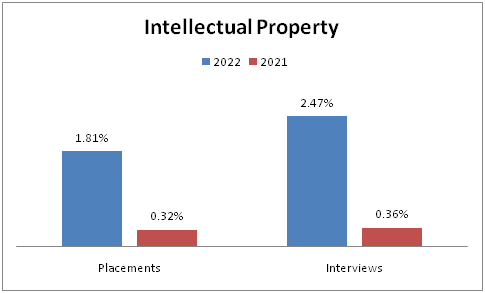
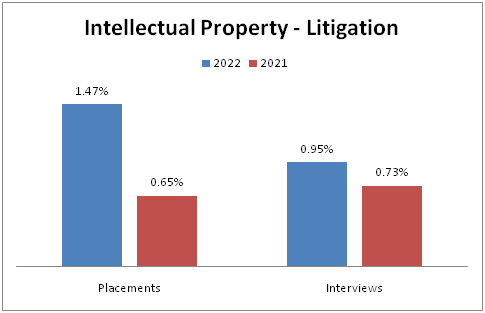
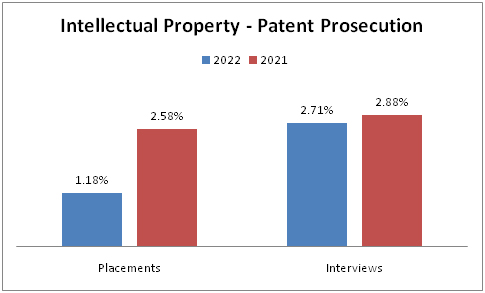
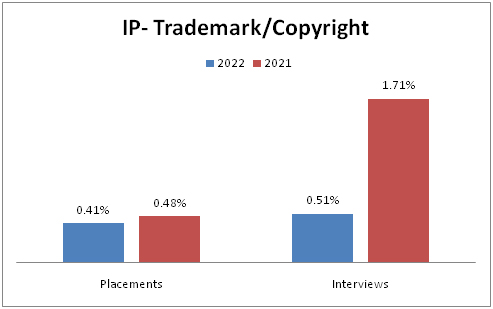
HOW ECONOMIC RECESSIONS SPECIFICALLY AFFECT PATENT LAW
The demand for Patent Law services tends to be cyclical and is often linked to economic conditions. During economic recessions, the following changes may occur in the Patent Law practice area:
Decrease in volume of patent applications filed: During economic downturns, there may be a decrease in the number of patent applications filed and less work for Patent attorneys.
Shift in demand for legal services related to different technologies and industries: During economic booms, there may be greater demand for legal services related to the protection of innovations in emerging technologies and industries. During economic downturns, there may be greater demand for legal services related to the protection of established technologies and industries.
Change in competition level in certain industries: During economic booms, there may be more competition among businesses, leading to increased demand for legal services related to IP protection.
HOW ECONOMIC RECESSIONS SPECIFICALLY AFFECT TRADEMARK LAW
The demand for Trademark Law services is often tied to economic conditions. During economic recessions, the need for these services may decrease as businesses focus on survival rather than growth. Here are a few specific ways in which economic recessions can impact Trademark Law:
Changes in the volume of trademark applications: During economic booms, there may be an increase in the number of trademark applications filed as companies invest in marketing and advertising. During economic downturns, there may be a decrease in the number of trademark applications filed.
Changes in the types of trademarks being sought: Economic booms may lead to a greater demand for legal services to protect innovative and distinctive trademarks in emerging industries. Economic downturns may lead to a greater demand for legal services related to established trademarks in established industries.
Changes in the level of competition: Economic booms may lead to increased competition among businesses, resulting in a higher demand for legal services related to trademark protection. Economic downturns may lead to less competition among businesses, decreasing the demand for trademark law services.
1. Real Estate
In Real Estate legal practice, there are many different areas of law that an attorney may specialize in. These can include residential and commercial real estate transactions, landlord-tenant law, property development, land use and zoning, real estate financing, and real estate litigation.
Real estate attorneys often work with clients who are buying or selling a home, negotiating a lease agreement, or dealing with a property dispute. They may also work with developers on large-scale projects, advise investors on real estate investment opportunities, and represent clients in court cases related to real estate matters.
Real estate law can be complex, and it is important for individuals and businesses to seek the advice of an experienced attorney when dealing with real estate transactions or disputes.
How the Economy Affects Real Estate Law
Changes in the Volume of Real Estate Transactions:
During economic booms, there may be an increase in the number of real estate transactions completed, leading to more work for Real Estate attorneys.
During economic downturns, there may be a decrease in the number of real estate transactions completed, resulting in less work for Real Estate attorneys.
Changes in the Types of Real Estate Transactions:
During economic booms, demand for legal services relating to commercial real estate acquisition and development may increase.
During economic downturns, demand for legal services relating to residential real estate sales and refinancing may increase.
Low-interest rates make borrowing money to invest in real estate more attractive, leading to an increase in demand for Real Estate legal services.
High-interest rates may make it less attractive to borrow money to invest in real estate, resulting in a decline in demand for Real Estate legal services.
Overall, the state of the economy and interest rates can significantly impact the demand for Real Estate legal services. When the economy is performing well, and interest rates are low, there may be more demand for these services. Conversely, during economic downturns when interest rates are high, there may be less demand for real estate law services.

PRACTICE AREAS NOT AFFECTED BY ECONOMIC CONDITIONS
1.Criminal Law
Criminal Law is a system of laws and regulations designed to protect society from harmful or dangerous behaviors and punish individuals who engage in such behaviors. While economic conditions may impact certain aspects of the criminal justice system, such as the resources available to law enforcement agencies or the number of crimes being committed, Criminal Law itself is generally not directly affected by economic conditions and is often immune from recessions.
Criminal Law is not affected by economic conditions and other external factors because it is based on a set of fundamental principles and values that are not subject to change. These principles, such as the protection of society and the right to a fair trial, are essential to the functioning of a just and civilized society.
Additionally, Criminal Law is designed to address behaviors considered harmful or dangerous to society, regardless of the economic consequences. For example, crimes such as murder, assault, and theft are illegal regardless of whether the economy is strong or weak. Similarly, regulatory crimes, such as
There are, however, some ways in which economic conditions may affect the criminal justice system. During a recession, there may be a decrease in funding for law enforcement agencies, which could impact their ability to investigate and prosecute crimes. In addition, economic downturns may lead to an increase in certain types of crimes, such as property crimes or fraud, as people become desperate to make ends meet.
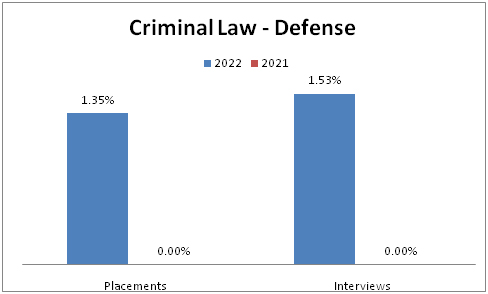
2.Estate Planning
Estate planning involves organizing and managing an individual's assets and property in anticipation of death or incapacitation. While economic conditions may impact certain aspects of estate planning, such as the value of an individual's assets or the tax consequences of certain estate planning strategies, estate planning itself is generally not directly affected by economic conditions and is often immune from recessions.
One reason that estate planning is not affected by economic conditions is that it is based on a set of fundamental principles and values that are not subject to change. These principles, such as the protection of an individual's assets and the orderly distribution of property upon death, are essential to the functioning of a just and civilized society. As such, they are not subject to fluctuations in the economy or other external factors.
Additionally, estate planning is designed to address issues considered essential to an individual's financial and personal well-being, regardless of the economic consequences. For example, issues such as asset protection, tax planning, and the distribution of property upon death are governed by laws and policies that are designed to protect an individual's assets and ensure that they are distributed according to the individual's wishes.
There are, however, some ways in which economic conditions may affect the estate planning process. For example, during a recession, an individual's assets may decrease in value, which could impact the estate's overall value. In addition, economic downturns may lead to changes in tax laws or other regulations, possibly impacting an individual's estate planning strategie
3.Environmental Law
Environmental Law is a practice area concerning the protection and preservation of the natural environment, including air, water, land, and natural resources. While economic conditions may impact certain aspects of Environmental Law, such as the ability of businesses to afford compliance with regulations or the funding available for environmental protection initiatives, Environmental Law is generally not directly affected by economic conditions and is often immune from recessions.
Environmental Law is not affected by economic conditions because it is based on a set of fundamental principles and values which are not subject to change. These principles, such as the protection of the natural environment and the promotion of sustainable development, are essential to the functioning of a just and civilized society. As such, they are not subject to fluctuations in the economy or other external factors.
Additionally, Environmental Law is designed to address issues considered important to the protection and preservation of the natural environment, regardless of the economic consequences. For example, issues such as pollution control, resource conservation, and the protection of endangered species are governed by laws and policies designed to protect the natural environment and promote sustainable development and are not affected by economic conditions.
There are, however, some ways in which economic conditions may affect the enforcement of environmental law. For example, during a recession, businesses may have difficulty affording the costs of compliance with environmental regulations or may face financial pressures that may lead to a decrease in environmental protection efforts. In addition, economic downturns may result in changes to government funding for environmental protection initiatives.
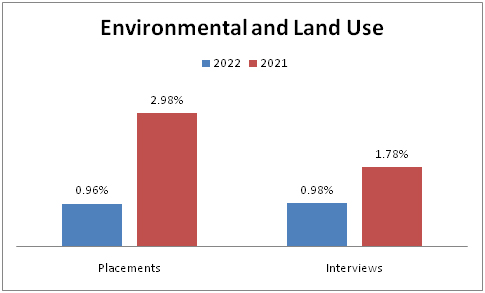
4.Family Law
Family Law is a practice area, dealing with issues related to family relationships, such as marriage, divorce, child custody, and adoption. While economic conditions may impact certain aspects of family law, such as the ability of individuals to afford legal representation or the availability of resources to
Family Law is not affected by economic conditions because it is based on a set of fundamental principles and values that are not subject to change. These principles, such as the child's best interests and the protection of the family unit, are essential to the functioning of a just and civilized society. As such, they are not subject to fluctuations in the economy or other external factors.
Family law is also designed to address issues considered essential to the well-being and stability of families and children, regardless of the economic consequences. Child custody, support, and adoption are governed by laws and policies designed to protect the child's best interests and promote the welfare of families and are not affected by economic conditions.
There are, however, some ways in which economic conditions may affect the family law system. During a recession, individuals may have difficulty affording legal representation or face financial strains that impact their ability to meet their child support obligations. In addition, economic downturns may lead to an increase in divorce rates, as couples may experience financial stresses that strain their relationships.
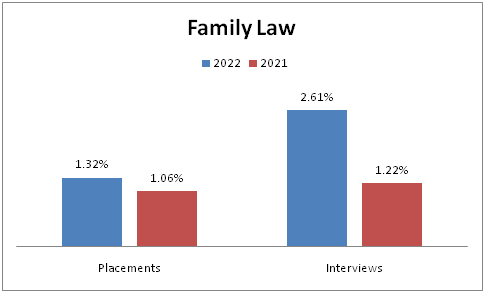
5.Health Law
Health Law is an area of legal practice focusing on issues related to the delivery and regulation of healthcare services; these include issues related to access, quality, and financing. While economic conditions may impact certain aspects of Health Law, such as the ability of individuals to afford healthcare or the availability of resources to support healthcare delivery, Health Law itself is generally not directly affected by economic conditions and is often immune from recessions.
One reason health law is not affected by economic conditions is that it is based on a set of fundamental principles and values that are not subject to change. These principles, such as the right to access healthcare and the promotion of public health, are essential to the functioning of a just and civilized society. Therefore, they are not subject to fluctuations in the economy or other external factors.
Additionally, health law is designed to address issues considered important to the delivery and regulation of healthcare services, regardless of the economic consequences. For example, issues such as patient rights, the regulation of healthcare providers, and the financing of healthcare are governed by
There are, however, some ways in which economic conditions may affect the healthcare system. During a recession, individuals may have difficulty affording healthcare or lose access to coverage due to job loss or other financial strains. In addition, economic downturns may lead to changes in government funding for healthcare programs, including the adoption of cost-cutting measures affecting the quality and accessibility of healthcare services.

6. Immigration Law
Immigration law is a legal practice area, concentrating on issues related to the movement of individuals into and out of a country, including issues related to visas, citizenship, and deportation. While economic conditions may impact certain aspects of Immigration Law, such as the demand for immigrant labor or the availability of resources to support immigration enforcement, Immigration Law itself is usually unaffected by economic conditions and is often immune from recessions.
One reason that immigration law is not affected by economic conditions is that it is based on a set of fundamental principles and values that are not subject to change. These principles, such as the protection of national security along with the promotion of humanitarian interests, are essential to the functioning of a just and civilized society. Therefore, they are not subject to fluctuations in the economy or other external factors.
Additionally, immigration law is designed to address issues considered important to the movement of individuals into and out of a country, regardless of the economic consequences. For example, issues such as the issuance of visas, the granting of citizenship, and the removal of individuals who entered the country illegally are governed by laws and policies designed to protect national security and promote humanitarian interests and are not affected by economic conditions.
There are, however, some ways in which economic conditions may affect the immigration system. During a recession, the demand for immigrant labor may decrease, leading to a decrease in the number of immigrants entering the country. Economic downturns can also result in changes in government funding for immigration enforcement or the adoption of cost-cutting measures, impacting the processing of immigration applications.
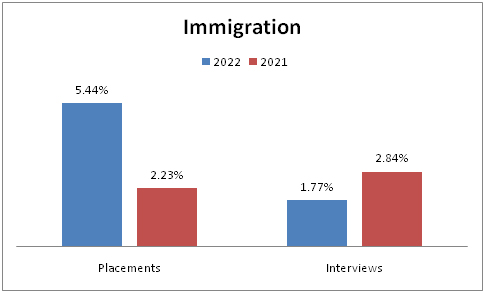
7. Probate Law
Probate Law is a legal practice area, dealing with the administration of an individual's estate after death. While economic conditions may impact certain aspects of Probate Law, such as the value of an individual's assets or the ability of beneficiaries to pay debts and taxes, Probate Law itself is generally not directly affected by economic conditions and is often immune from recessions.
Probate law is not affected by economic conditions because it is based on a set of fundamental principles and values that are not subject to change. These principles, such as the protection of an individual's assets and the orderly distribution of property upon death, are essential to the functioning of a just and civilized society; , they are not subject to fluctuations in the economy or other external factors.
Additionally, probate law is designed to address issues considered important to the administration of an individual's estate, regardless of the economic consequences. Issues such as the payment of debts and taxes, the distribution of property to beneficiaries, and the resolution of disputes are governed by laws and policies designed to protect an individual's assets, ensuring that they are distributed following the individual's wishes.
There are, however, some ways in which economic conditions may affect the probate process. During a recession, an individual's assets may decrease in value, which could impact the estate's overall value. Economic downturns may also lead to changes in tax laws or other regulations impacting the administration of an individual's estate.
Overall, while economic conditions may indirectly impact the probate process, Probate Law itself is generally not affected by economic conditions and is often immune from recessions.
8. Tax Law
Tax Law is a legal practice area examining issues related to the assessment and collection of taxes by governments. While economic conditions may impact certain aspects of Tax Law, including the ability of individuals and businesses to afford taxes or the availability of resources to support tax enforcement, Tax Law itself is generally not directly affected by economic conditions and is often immune from recessions.
Additionally, Tax Law is designed to address issues considered important to the assessment and collection of taxes, regardless of the economic consequences. Issues such as the calculation of tax liability, the enforcement of tax laws, and the resolution of tax disputes are governed by laws and policies designed to promote economic stability and ensure the fair distribution of the tax burden.
There are, however, some ways in which economic conditions may affect the tax system. During a recession, individuals and businesses may have difficulty affording their tax obligations or may face financial strains impacting their ability to comply with tax laws. Economic downturns may also lead to changes in tax laws or the adoption of measures to stimulate economic growth, such as tax cuts or credits.
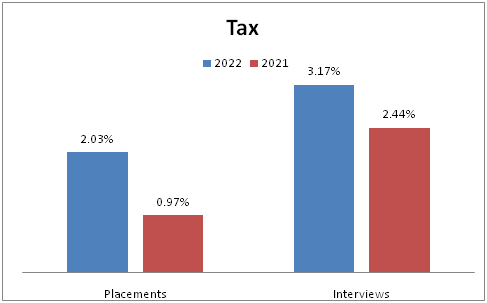
COUNTERCYCLICAL PRACTICE AREAS THAT OFTEN DO BETTER IN RECESSIONS
A countercyclical legal practice area is a legal area that tends to be more active or in demand during times of economic downturn or recession. These legal practice areas are typically related to issues that arise as a result of economic conditions.
1. Antitrust
Antitrust Law is a body of laws designed to promote competition in the marketplace and prevent companies from engaging in anticompetitive behavior. In the United States, Antitrust Law is enforced by the Federal Trade Commission (FTC) and the Department of Justice (DOJ). These agencies are responsible for investigating and enforcing antitrust violations, such as price-fixing, monopolization, and other anticompetitive conduct.
In addition to economic downturns, antitrust violations may also occur during market consolidation, when a few large companies dominate a particular industry or market. These dominant firms may use their market power to engage in anticompetitive conduct, such as pricing their products or services at artificially high levels or engaging in exclusive dealing agreements with customers or suppliers.
As a result, antitrust practices are often countercyclical because they tend to see an increase in demand for their services during an economic recession or market instability. Government agencies responsible for enforcing antitrust laws are more likely to receive complaints or reports of anticompetitive conduct during these times.
In addition to the economic and market factors that can lead to an increase in demand for antitrust services, several other factors can contribute to the countercyclical nature of antitrust practices. For example, antitrust laws can be complex and vary from jurisdiction to jurisdiction, creating a demand for specialized legal expertise. Additionally, antitrust cases can be time-consuming and resource-intensive and may involve the analysis of large amounts of data and complex economic models.
Overall, Antitrust tends to be countercyclical. This increased demand for antitrust services can lead to a surge in demand for legal expertise in this area, particularly from firms specializing in Antitrust Law, which have the resources and expertise to handle complex cases.
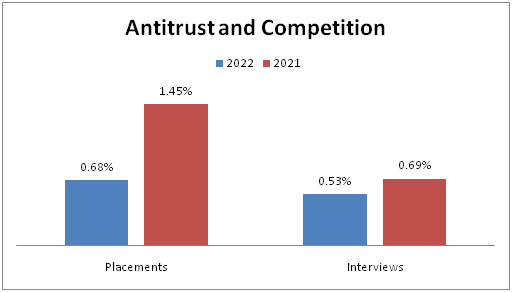
2. Bankruptcy
Bankruptcy is a legal process, allowing individuals or businesses to restructure or liquidate their debts when they cannot pay them. It is considered a countercyclical legal practice area because it tends to be more active or in demand during an economic recession or downturn.
Bankruptcy also provides a legal framework for individuals and businesses to address their financial problems and find a path forward. During an economic recession, individuals and businesses may be overwhelmed by debt and uncertain about how to handle it. Bankruptcy provides a way for them to get a fresh start and make a plan to pay off their debts or restructure them more easily.
Individuals and businesses can file for several types of bankruptcy, depending on their circumstances. Chapter 7 bankruptcy allows individuals or businesses to liquidate assets to pay off debts. Chapter 11 bankruptcy allows businesses to reorganize debts and continue operations. In contrast, Chapter 13 bankruptcy allows individuals to reorganize debts and pay them off over time.
Bankruptcy can be a complex and nuanced legal process, and individuals and businesses often seek the assistance of Bankruptcy lawyers to help them navigate the process. Bankruptcy lawyers can provide guidance on bankruptcy options, help individuals and businesses understand these choices, and represent them in Bankruptcy court.
Overall, bankruptcy is a countercyclical legal practice area because it tends to be more active or in demand during an economic recession or downturn. It provides a legal framework for individuals and businesses to address financial problems and find a path forward.
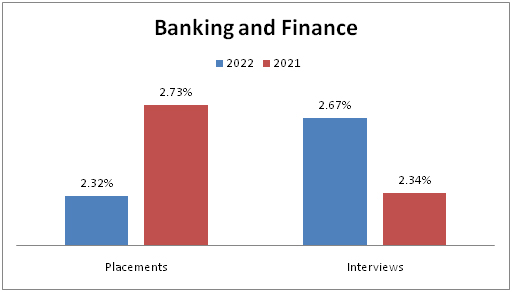
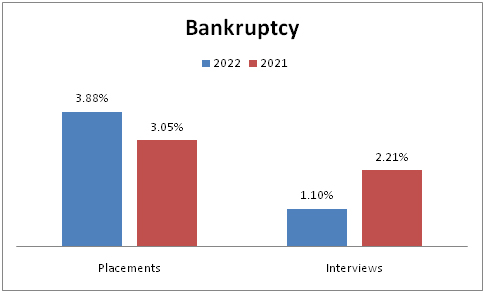
3. Consumer Protection Law
Consumer Protection Law is a legal area, dealing with issues related to the protection of consumers from fraudulent or deceptive business practices. It is considered a countercyclical legal practice area because it tends to be more active or in demand during an economic recession or downturn.
Consumer Protection Law is countercyclical because it is directly tied to economic conditions. Consumer Protection cases tend to increase during an economic recession as individuals may be more vulnerable to scams or other fraudulent activity as they seek ways to save money or make ends meet.
Consumer Protection Law provides a way for individuals to hold businesses accountable for fraudulent or deceptive practices and seek compensation for any losses they have suffered. It provides a legal framework for individuals to seek remedies when they have been defrauded or otherwise mistreated by businesses.
Consumer Protection Law is enforced by various government agencies and organizations, including the FTC and the Attorney General in all states. These agencies can investigate consumer complaints, bring enforcement actions against businesses that engage in fraudulent or deceptive practices, and provide resources and assistance to consumers who have been harmed.
Consumer Protection lawyers are crucial in enforcing Consumer Protection laws and helping individuals seek remedies when they have been defrauded or mistreated by businesses. During an economic recession, Consumer Protection lawyers may experience increased demand for their services as individuals seek help navigating the legal system along with compensation for their losses.
Overall, Consumer Protection Law is countercyclical; it tends to be more active or in demand during economic recessions or downturns . Consumer Protection lawyers may experience increased demand for their services during an economic recession.
4. Employee Benefits
Law firms specializing in Employee Benefits are often considered countercyclical because they tend to experience relatively stable demand for their services, even during economic downturns. This is because employee benefits, including retirement plans, health insurance, and other forms of compensation, are typically considered essential for attracting and retaining top talent in the workforce.
Another factor contributing to the countercyclical nature of Employee Benefits practice is the complexity of the legal landscape surrounding these issues. The laws and regulations governing employee benefits constantly evolve, and compliance can be a significant challenge. Companies may turn to legal experts to help navigate this complex environment, even during economic downturns.
In addition to the stability of demand for employee benefits , this practice area is characterized by a high level of specialization. Attorneys typically have a deep understanding of the technical and legal aspects of employee benefits and the business strategies and human resources considerations that come into play. This specialized knowledge is often in high demand, even during economic uncertainty.
Finally, the countercyclical nature of employee benefits practice may also be influenced by the
long-term nature of many employee benefits agreements. For example, retirement plans and other long-term benefits typically involve long-term commitments and may be less subject to fluctuations than other short-term legal services.
While economic conditions can certainly impact the demand for legal services in general, the countercyclical nature of Employee Benefits practice makes it a relatively stable area for law firms to focus on, even during economic uncertainty. By understanding the factors contributing to this stability, law firms can better position themselves to weather economic downturns and continue providing valuable legal services to their clients.
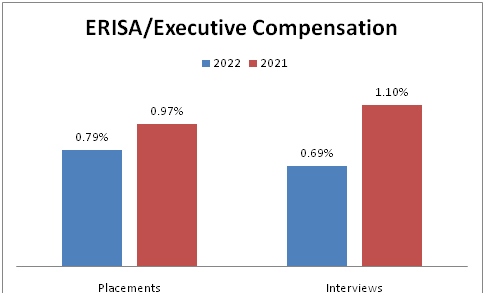
5. Labor and Employment
Labor and Employment Law is a practice area that is countercyclical for law firms. This means that the demand for these legal services tends to increase during economic downturns and decrease during economic booms. There are a few key reasons why this is the case.
Another reason why labor and employment law is countercyclical is that there is typically more job mobility during economic downturns. When the job market is tight with fewer job openings, employees may be more likely to consider switching jobs or moving to a new company. This can lead to increased legal issues related to hiring, firing, and employment contracts.
Additionally, the COVID-19 pandemic has significantly impacted the Labor and Employment law practice area. Many companies were forced to lay off employees or reduce their hours due to the pandemic’s economic impact, leading to increased employment disputes and legal issues. At the same time, the pandemic has led to new legal issues related to remote work, furloughs, and more.
In general, Labor and Employment Law is closely tied to the economy's overall health. When the economy is struggling, companies may be more likely to cut costs and reduce their workforce, increasing legal issues related to employment. When the economy is strong, and there are plenty of job opportunities, companies may face fewer legal issues related to employment.
During economic downturns, there may be an increase in disputes relating to layoffs, terminations, and other employment issues as businesses struggle to stay afloat. This can lead to an increase in employment-related disputes being filed and more work for Labor and Employment attorneys at large law firms. During economic booms, there may be a decrease in the number of employment-related disputes being filed and less work for Labor and Employment attorneys. However, there may also be greater demand for legal services related to the expansion and growth of businesses, such as drafting and negotiating employment contracts and advising on compliance with employment laws.
Overall, Labor and Employment Law is an important practice area for law firms, particularly during times of economic uncertainty. As the economy continues to recover from the COVID-19 pandemic, the demand for Labor and Employment legal services will likely remain strong in the coming years.
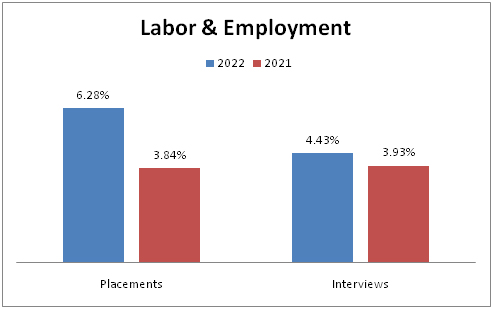
6. Litigation
Litigation had been predicted to bounce back after pandemic-related court closures resulted in case backlogs However, a study of federal courts revealed that there were actually fewer pending civil cases two years after the pandemic than would have been expected, based on pre-COVID trends. This was mainly due to a 6% decrease in civil cases filed during the first two years of the pandemic. According to Thomson Reuters' Peer Monitor, demand for litigation services saw a slight dip of 0.4% through the first three quarters of 2022.
Despite this dip, some experts believe that the most successful litigation practices in 2023 may be those that focus on taking major cases to trial. While the pandemic has slowed the progress of many
high-profile cases, they are still pending and may be less likely to be resolved without the pressure of a trial.
The state of the economy has traditionally influenced litigation flow at large law firms in a number of ways. In general, the demand for litigation services tends to be cyclical and is often linked to economic conditions. When the economy is performing well and businesses are thriving, there may be less demand for litigation services as there are fewer disputes and legal issues. On the other hand, when the economy is performing poorly and businesses are struggling, there may be more demand for litigation services as there are more disputes and legal issues arising.
There are a few specific ways the state of the economy can influence litigation in large law firms. One way is through changes in the volume of litigation cases being filed as discussed above. Another way in which the state of the economy can influence litigation in large law firms is through changes in the types of cases being handled. During economic downturns, there may be an increase in the number of bankruptcy and restructuring cases and in the number of disputes related to contracts and employment. These cases may require the expertise of litigators at large law firms. While during economic booms, there may be greater demand for transactional legal services, such as mergers and acquisitions, which may not require as much litigation work.
Overall, it is clear that the state of the economy can have a significant impact on the demand for litigation services at large law firms. When the economy is performing well, there may be less demand for litigation work; during economic downturns, there may be more demand for litigation services.
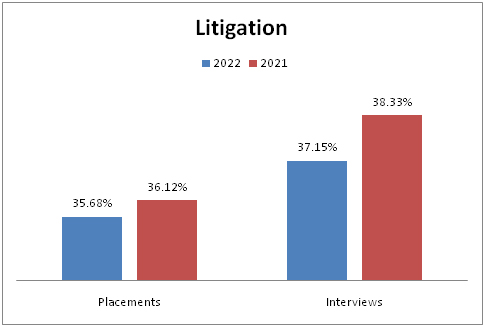
7. Workers Compensation
Worker's Compensation is a legal practice area, focusing on issues related to the protection of workers who are injured on the job, including medical treatment, lost wages, and disability benefits. During times of economic recession, the Workers' Compensation legal practice area is likely to be affected in several ways, including changes in the volume of Worker's Compensation claims, the amount of benefits paid, and the demand for Worker's Compensation lawyers.
In a recession, the volume of Worker's Compensation claims may increase. During economic downturns, the number of workers who are injured on the job may increase due to factors such as job loss, job insecurity, and stress. Additionally, the number of workers who are eligible for Worker's Compensation benefits may increase due to changes in employment patterns, such as an increase in the number of part-time or temporary workers.
Another way that the workers' compensation legal practice area is likely to be affected by recessions is that the amount of benefits paid may decrease. During times of economic downturn, employers may be more likely to contest worker's compensation claims or to negotiate lower settlements, as they may be more concerned about the impact of benefit payments on their financial stability. Additionally, the value of worker's compensation benefits may decrease due to factors such as inflation or changes in the cost of living. As a result, the amount of benefits paid to workers may decrease during times of economic recession.
There is limited evidence available on how the workers' compensation legal practice area is affected by economic recessions, as the impact of recessions on worker's compensation claims and benefits can vary depending on several factors, including the severity of the recession, the industries most affected by the recession, and the laws and regulations governing workers compensation in a given jurisdiction. However, based on the ways in which other legal practice areas have been affected by recessions in the past, it is likely that the workers' compensation legal practice area will be affected by economic recessions, potentially experiencing changes in the volume of claims and the amount of benefits paid.
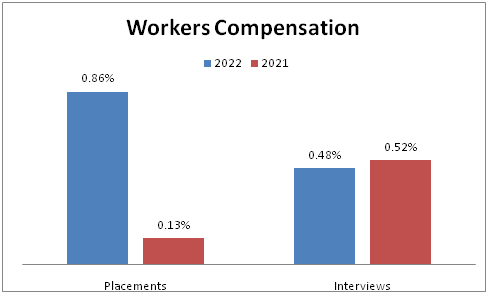
OTHER PRACTICE AREAS
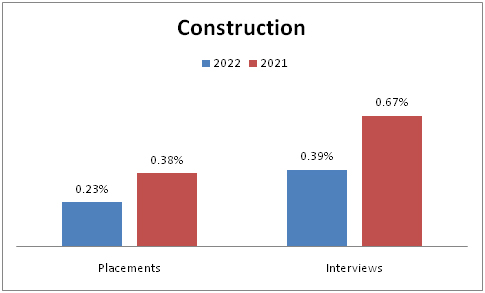
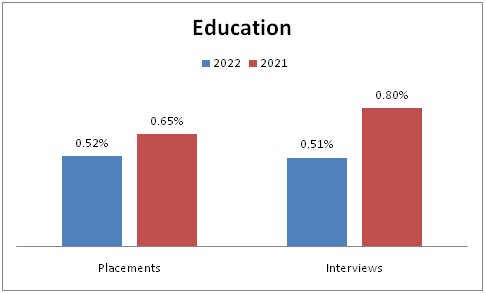

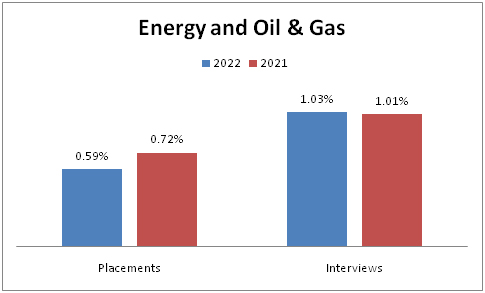

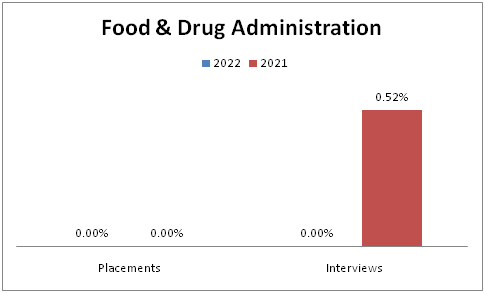
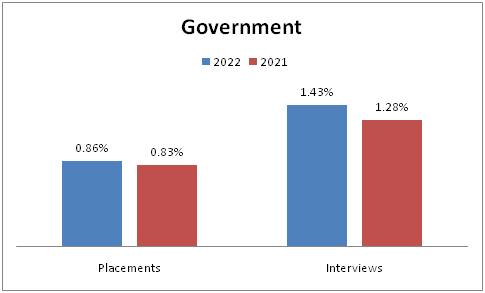

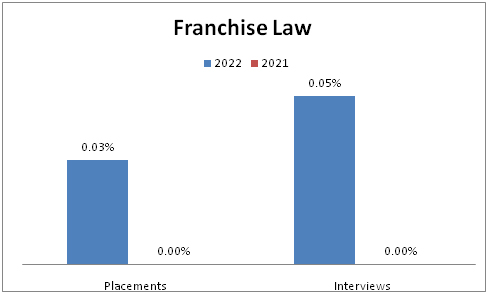
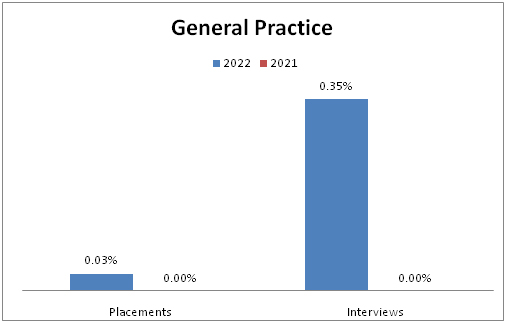
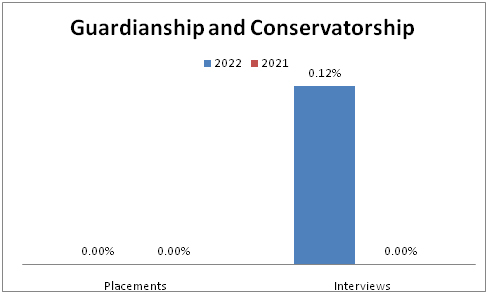
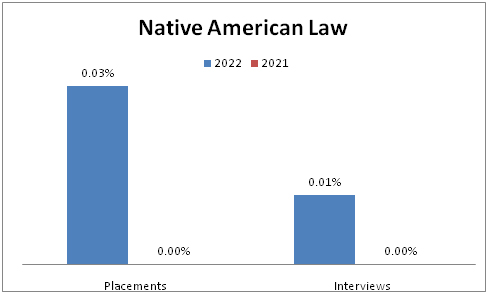
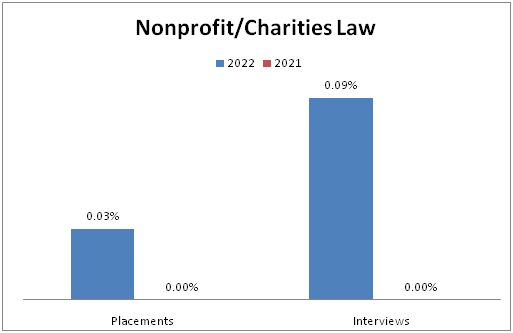
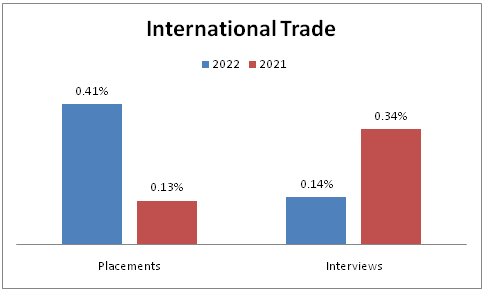
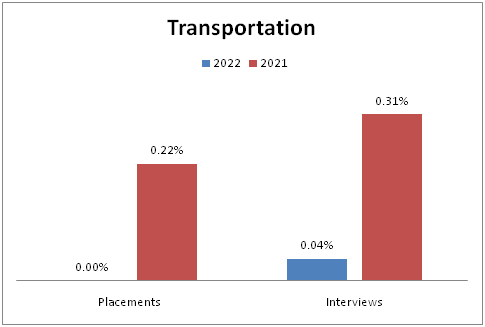
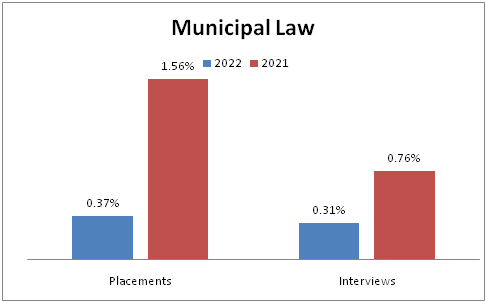
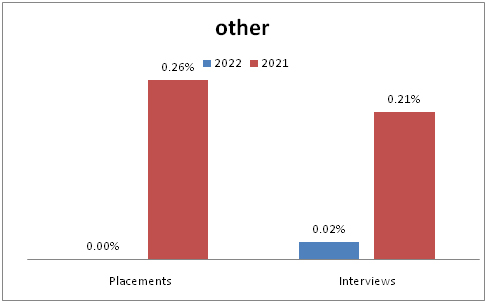
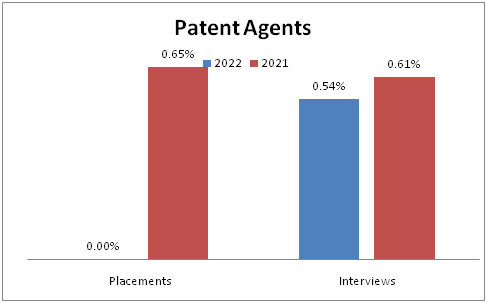
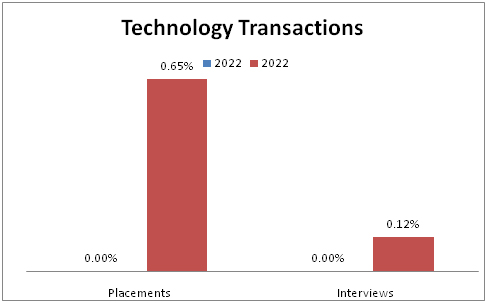
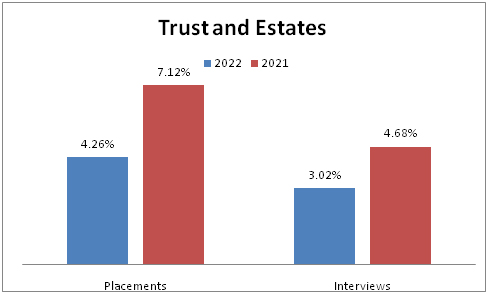
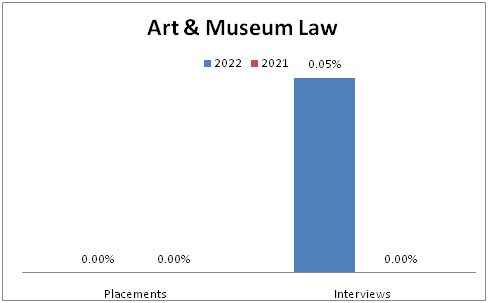
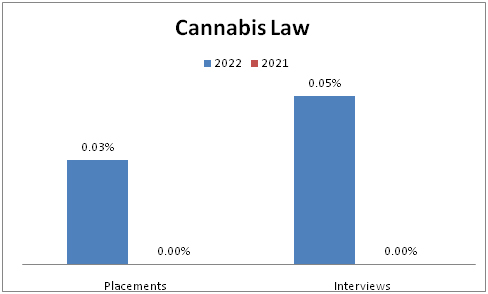
REGION AND PRACTICE AREA WISE GRAPH
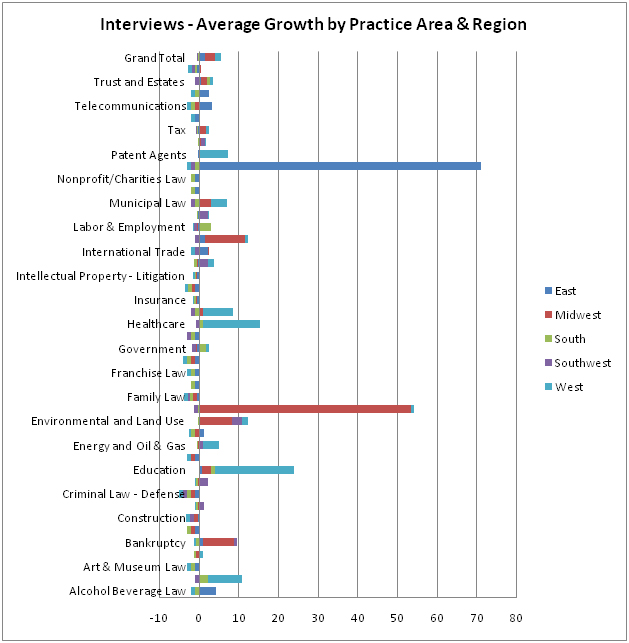
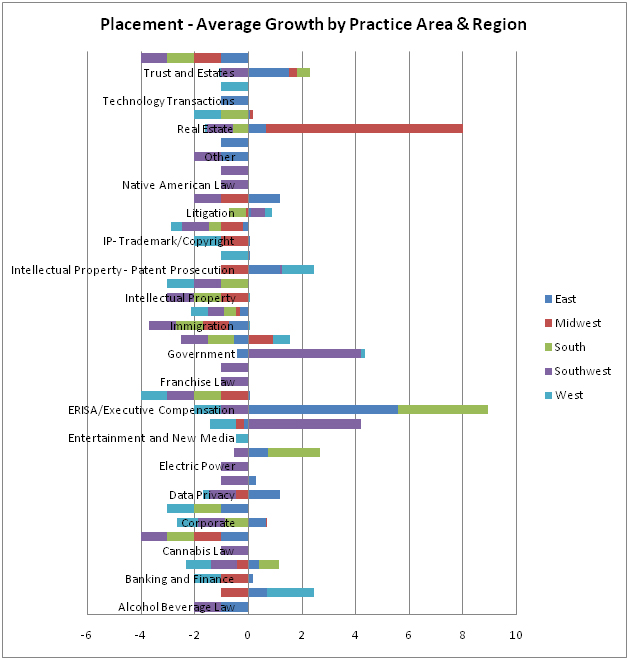
MAJOR LEGAL MARKETS LEAST AFFECTED BY RECESSIONS
1. California
The legal market in California is unique in many ways, including its ability to weather economic downturns better than many other markets. This is due to several factors, including the state's diverse economy, strong demand for legal services in certain practice areas, and the abundance of highly qualified attorneys.
One reason why the California legal market tends to do well in recessions is the state's diverse economy. While home to many large, deal-driven law firms that may be impacted by a slowdown in M&A and IPO
Another factor contributing to the resilience of the California legal market is the strong demand for legal services in certain practice areas. The state has a large and growing tech sector, leading to a surge in demand for intellectual property lawyers. California also has some of the most stringent labor and employment laws in the country, fueling demand for labor and employment attorneys. Similarly, the state's stringent environmental regulations have created a need for environmental lawyers. These practice areas tend to be countercyclical, as companies need to navigate complex regulations and protect their interests during economic downturns.
Another reason why the California legal market tends to do well during recessions is the abundance of highly qualified attorneys. California is home to some of the top law schools in the country, including the University of California, Berkeley School of Law, Stanford Law School, and the University of Southern California (USC) Gould School of Law. These schools produce a steady stream of highly qualified attorneys who are in high demand by law firms, particularly in the competitive California market.
Overall, the combination of a diverse economy, strong demand for legal services in certain practice areas, and an abundance of highly qualified attorneys has made the California legal market relatively resilient during economic downturns. While the state has certainly not been immune to the effects of recessions, its legal market has generally fared better than many other markets, with law firms continuing to search for qualified talent at all levels, even during economic downturns.
2. Colorado
Colorado does well in recessions as its economy is diversified and not reliant on any single industry. While the state does have a strong presence in the technology and energy sectors, it also has a diverse range of industries, including agriculture, manufacturing, and tourism.
This diversification helps to insulate the state from economic downturns in any single industry, which can lead to a more stable legal market. Colorado is also home to a number of federal agencies and departments, providing a steady stream of legal work, regardless of the state of the economy.
Furthermore, the legal market in Colorado is supported by a strong business community. The state consistently ranks high in terms of business-friendly regulations and has a high concentration of small businesses. This provides a steady stream of legal work for firms specializing in Business Law.
Finally, the legal market in Colorado benefits from a well-educated workforce. The state is home to a number of universities and colleges, which produce a steady supply of qualified attorneys. This can help law firms in Colorado to weather economic downturns by having access to a pool of talented attorneys to fill open positions.
The combination of a diversified economy, a strong business community, and a well-educated workforce has helped to make the legal market in Colorado more resilient to economic downturns. This has allowed law firms in the state to weather recessions better than those in more heavily concentrated legal markets such as New York.
3. Florida
The legal market in Florida tends to be less affected by recessions than in other states. This is due to a number of factors, including the state's diverse economy and the fact that it is home to many large companies in industries that tend to be less affected by economic downturns.
Florida has a diverse economy. While the state is known for its tourism industry, it is also home to a range of other industries, thus providing stability during economic downturns. For example, Florida is a hub for the aerospace and defense industry, with companies like Lockheed Martin and Northrop Grumman having a strong presence in the state. It is also home to many healthcare companies, including hospitals and pharmaceutical manufacturers, which tend to be less impacted by economic downturns.
IFlorida is also home to many large companies that are less reliant on capital markets and private equity work. Its numerous Fortune 500 companies include Publix Super Markets and NextEra Energy. These companies tend to have strong balance sheets and are able to weather economic downturns more easily than smaller companies which may rely more on external funding.
Overall, the legal market in Florida is more resilient to economic downturns than many other states, due to its diverse economy and the fact that it is home to many large, stable companies. While the state is not immune to the effects of a recession, it tends to fare better than states with a narrower economic base and a greater reliance on capital markets and private equity funding. As a result, law firms in Florida may be more likely to continue hiring and expanding during a recession.
4. Texas
The legal market in Texas tends to do better in recessions than other legal markets such as New York. This is due to several factors.
First, Texas has a diverse and strong economy that is less reliant on financial services, compared to other states. The state is home to major industries such as oil and gas, healthcare, technology, and aerospace, providing a stable economic foundation and helping to insulate the legal market from the ups and downs of the financial sector.
Second, the legal market in Texas is characterized by a high level of competition among law firms, which helps to keep legal fees competitive and drives innovation in the industry. This competitive environment allows firms to better weather economic downturns, as they are able to adapt and find new ways to attract and retain clients.
Third, the legal market in Texas is supported by a strong network of legal professionals and organizations, including bar associations and law schools, which provide resources and support to lawyers and help to sustain the industry. This network helps to ensure that the legal market remains vibrant and responsive to the needs of clients, even during economic downturns.
Finally, the legal market in Texas is supported by a favorable business climate and strong regulatory environment, which helps to attract and retain businesses, supporting the growth of the legal industry. This includes favorable tax policies, a pro-business regulatory environment, and a strong infrastructure, all contributing to a strong and stable legal market.
5. Washington, DC
The legal market in Washington, D.C. has traditionally been less reliant on capital markets and private equity work compared to other major legal markets such as New York. This has contributed to the
One factor contributing to the D.C. legal market's relative immunity to economic downturns is the strong presence of government agencies and in-house legal departments in the region. The D.C. metropolitan area is home to numerous federal agencies, international organizations, and non-profits, all of which require legal services on a regular basis. These entities are often less sensitive to economic fluctuations and can provide a steady stream of work for law firms in the region.
Additionally, the D.C. legal market has a strong focus on regulatory and policy work, which is often less sensitive to economic downturns. Many law firms in the region have practices dedicated to advising clients on issues related to federal regulations, Administrative Law, and Government Affairs. These practices often see an increase in demand during times of economic uncertainty as companies and organizations seek legal guidance on navigating the changing regulatory landscape.
Another factor contributing to the resilience of the D.C. legal market is the presence of a large number of boutique law firms specializing in specific areas of law. These firms often have highly specialized practices which are less affected by economic downturns, as these specialties are in high demand regardless of economic conditions.
Finally, the D.C. legal market has a strong reputation for attracting top legal talent, which has helped it weather economic downturns in the past. Many attorneys are drawn to the region due to the opportunity to work on high-profile legal matters and to be part of the policy-making process. This pool of top legal talent has helped law firms in the region to continue to attract and retain top clients, even during economic downturns.
INTERVIEWS AND PLACEMENTS - AVERAGE OF GROWTH BY REGION
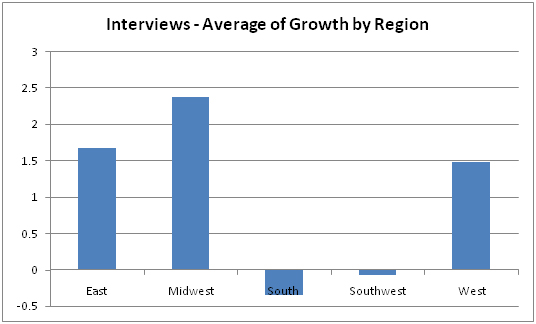
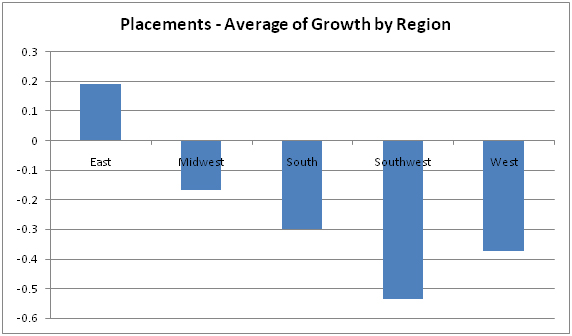
OTHER STATES LIKELY TO REMAIN STABLE AND BE UNAFFECTED BY LEGAL RECESSIONS
1. Alabama
The legal market in Alabama has traditionally been heavily reliant on the state's industries, including manufacturing, healthcare, and agriculture. The performance of the legal market in Alabama during economic downturns can often be influenced by the performance of these industries.
During recessions, industries such as manufacturing and agriculture can often see a decline in demand and revenue, leading to reduced legal work in areas such as corporate transactions, IP, and Employment Law. However, the healthcare industry has historically been less affected by economic downturns, and this has often resulted in a steady demand for legal services in areas including regulatory compliance, mergers and acquisitions, and healthcare litigation.
The legal market in Alabama can also be impacted by broader economic trends. During the Great Recession of 2008, the state saw a significant increase in bankruptcy filings and foreclosure proceedings, leading to an increased demand for legal services in these areas.
Despite these potential challenges, the legal market in Alabama has consistently demonstrated resilience during economic downturns. This can be attributed to a number of factors, including the state's relatively low cost of living and business operating costs, which can make it an attractive location for companies looking to cut costs. In addition, the state's strong network of small and mid-sized law firms, which often have a more diverse range of practice areas, can provide a level of stability during economic downturns.
Overall, while the legal market in Alabama may be affected by economic downturns, it has consistently demonstrated the ability to adapt and find opportunities for growth during these challenging times.
2. Arizona
The legal market in Arizona tends to be a relatively stable market, even during economic downturns. One reason for this stability is that Arizona is home to a number of Fortune 500 companies, including Phoenix-based Avnet and Tucson-based Raytheon Missile Systems. These companies have a strong presence in the state and are likely to continue operating and requiring legal services even during economic downturns.
Additionally, Arizona is home to several industries that tend to be relatively resilient during recessions, including healthcare and education. For example, the state is home to several hospitals, healthcare systems, and many universities and colleges. These industries tend to be relatively stable and continue to require legal services even during economic downturns.
Finally, the legal market in Arizona tends to be less reliant on capital markets and private equity work than some other markets, such as New York and California. This means that the state is less vulnerable to the slowdown in deal flow that often occurs during economic downturns.
Overall, while the legal market in Arizona may not be immune to the effects of a recession, it tends to be a relatively stable market with a diverse range of industries and clients. This stability is likely to continue,
3. Arkansas
The Arkansas legal market tends to be relatively stable during economic downturns. While it may not experience the same level of growth as some other legal markets, it does tend to avoid the significant declines that some markets experience. This stability is due in part to the fact that the Arkansas economy is not heavily reliant on any one industry; its diverse mix of industries helps to insulate it from economic shocks.
One key reason for the stability of the Arkansas legal market during recessions is the strong presence of government agencies and organizations. These entities, such as state government and various federal agencies, are generally less sensitive to economic downturns and continue to operate and require legal services regardless of the state of the economy. This helps to provide a steady source of demand for legal services in the state.
The Arkansas legal market is also supported by several Fortune 500 companies that have a significant presence in the state. These companies, including Walmart and Tyson Foods, are typically able to weather economic downturns and require legal services, even during challenging economic times.
Another factor contributing to the Arkansas legal market’s stability during recessions is the state's low cost of living. This makes it an attractive location for businesses and individuals, which can help to drive demand for legal services. Additionally, the state's central location within the United States makes it a convenient location for businesses that may seek to expand or relocate during an economic downturn.
While the Arkansas legal market may not experience the same level of growth as some other markets during times of economic expansion, it tends to be relatively stable during recessions. This is due to a combination of factors, including the presence of government agencies and Fortune 500 companies, the state's low cost of living, and its convenient location within the United States.
4. Connecticut
The Connecticut legal market has a unique position in the Northeast region of the United States, and its performance in recessions tends to be influenced by several factors.
One of the main drivers of the Connecticut legal market is the state's proximity to New York City, a hub for financial and legal services. Many law firms in Connecticut have a strong focus on corporate and financial matters, and they often serve as counsel for clients based in New York. This connection to the New York market can provide a buffer for Connecticut law firms during economic downturns, as the demand for legal services related to finance and corporate transactions tends to be relatively stable, even during economic uncertainty.
Additionally, Connecticut has a strong presence in the insurance industry, which can also contribute to the stability of the legal market during recessions. Insurance companies often require legal services related to regulatory compliance, risk management, and litigation; this demand tends to remain constant even in economic downturns.
While the Connecticut legal market is not immune to the effects of recessions, it has generally remained relatively resilient. During the 2008 recession,, the state's legal market saw only a modest decline in demand for legal services, and many law firms were able to maintain their staffing levels and revenue.
Overall, the Connecticut legal market tends to be relatively stable during recessions, and it is often able to weather economic downturns better than some other legal markets. While it may not experience the same level of growth as it would during economic expansions, the demand for legal services in Connecticut remains relatively constant, even in times of economic uncertainty.
5. Delaware
It is difficult to generalize about the performance of the Delaware legal market during recessions, as the state is home to a diverse range of industries and legal practices. However, it is worth noting that Delaware is often considered a hub for Corporate Law, particularly in the areas of mergers and acquisitions, corporate governance, and finance. As such, the state's legal market may be influenced by trends in these areas.
During economic downturns, the volume of M&A activity tends to decrease, as businesses are less likely to make significant investments or take on additional debt. This can lead to a slowdown in demand for Corporate Law services in Delaware, as fewer transactions occur. However, it is worth noting that M&A activity tends to pick up again once the economy recovers, and Delaware's reputation as a hub for Corporate Law may attract more business as a result.
In addition to M&A, the demand for corporate governance and finance services may also be impacted by economic downturns. Companies may be less likely to seek out legal counsel for new financing deals or for guidance on governance issues during a recession. However, these areas may also experience increased demand as companies seek to restructure or reorganize in response to economic challenges.
Overall, it is likely that the Delaware legal market will see some level of disruption during recessions, as demand for certain legal services may decrease. However, the state's strong reputation in the Corporate Law arena may help to buffer some of the impact, and the market may bounce back relatively quickly once the economy recovers.
6. Georgia
The Georgia legal market tends to perform relatively well during recessions, as it is home to a diverse range of industries that provide a steady source of legal work. These industries include healthcare, logistics and transportation, financial services, and technology.
One reason the Georgia legal market performs well during recessions is the state's strong economy. Georgia has a highly educated workforce and a business-friendly environment which attracts a large number of companies to the state. This helps to insulate Georgia’s legal market from the worst effects of an economic downturn.
In addition to its diverse economy, Georgia is also home to several Fortune 500 companies, including The Home Depot, Delta Air Lines, and Coca-Cola. These large corporations generate a significant amount of legal work, helping to sustain the Georgia legal market during recessions.
Another factor contributing to the Georgia legal market's resilience during recessions is the state's growing population. Georgia's population has been steadily increasing over the past decade, and this
The Georgia legal market is also home to several prominent law firms, including King & Spalding, Paul Hastings, and Alston & Bird. These firms have a strong presence in the state and are well-positioned to weather economic downturns.
In summary, the Georgia legal market tends to perform well during recessions due to its diverse economy, strong population growth, and the presence of large corporations and prominent law firms. While the legal market in Georgia is not immune to the effects of a recession, its strong foundation helps it to weather economic challenges and emerge from downturns in a strong position.
7. Hawaii
It is difficult to say with certainty how the Hawaii legal market performs in recessions, as the state has not experienced a significant economic downturn since the Great Recession of 2007-2009. However, there are several factors suggesting that the Hawaii legal market may be relatively insulated from a recessions’ effects..
Hawaii’s economy is diverse, driven by sectors such as tourism, the military, education, and healthcare. While some industries, including tourism, may be more susceptible to economic downturns, the presence of these other industries may help to cushion the blow to the legal market. The state's strong regulatory and compliance framework may also create a steady demand for legal services in certain areas, even during economic downturns.
Hawaii’s legal market is relatively small, with only a handful of large law firms and a significant number of solo practitioners and small firms. This may make it less vulnerable to the fluctuations and consolidations that can occur in larger legal markets during recessions.
Overall, it seems that the Hawaii legal market has not faced significant layoffs or downsizing during past recessions. Yet it is worth noting that law firms in the state, like any business, may be impacted by changes in the overall economy and may need to adapt their business strategies in response to changing market conditions.
8. Idaho
It is difficult to predict exactly how any specific legal market will perform during a recession, as the economic impacts of recessions can vary greatly. However, it is generally accepted that legal markets tend to be somewhat countercyclical, meaning that they may experience increased demand for legal services during economic downturns.
The Idaho legal market is likely no exception to this trend. During recessions, businesses may face challenges such as decreased demand for goods and services, financial difficulties, and disruptions to supply chains. These challenges can often lead to an increase in legal disputes as businesses seek to protect their interests and negotiate favorable outcomes.
In Idaho, the practice areas that may see increased demand during a recession include bankruptcy, restructuring, and insolvency law, as businesses seek to restructure their debts or negotiate with creditors. Employment Law may also see increased demand, as businesses may face challenges related to layoffs, furloughs, and other employment issues.
Although demand for legal services may increase during a recession, law firms may face financial challenges. Some firms may need to reduce their headcount in order to cut costs and weather the
In the Idaho legal market, it is difficult to note the specific law firms that laid off attorneys during past recessions, as this information is often not publicly disclosed. Thus, it is important for attorneys considering a move to a new firm to carefully research the financial stability and track record of that firm, particularly during times of economic uncertainty. Overall, it is important for attorneys in the Idaho legal market to be prepared for the potential challenges and opportunities that may arise during a recession, and to be proactive in seeking out opportunities to grow and develop their practices.
9. Indiana
The Indiana legal market tends to perform relatively well during recessions, thanks in part to the state's diverse economy. While certain sectors, such as manufacturing and retail, may be more vulnerable to economic downturns, Indiana has a strong presence in industries such as healthcare, logistics, and agriculture, which tend to be more resilient during times of economic uncertainty.
One of the reasons the Indiana legal market fares well during recessions is the state's low cost of living and doing business, which makes it an attractive location for companies looking to cut costs. This can lead to an increase in demand for legal services related to mergers and acquisitions, corporate restructuring, and other areas of Corporate Law.
Additionally, Indiana's strong agricultural sector can provide a buffer for the legal market during recessions, as the demand for legal services related to agriculture tends to remain steady even during economic downturns. The state is also home to several major healthcare providers, which can also provide a steady stream of work for attorneys specializing in healthcare law.
Indiana also has a strong business community. Indiana has a reputation as a pro-business state, with a supportive business environment and several major corporations headquartered in the state. This can lead to a steady flow of work for attorneys practicing in areas such as Corporate Law, Intellectual Property, and Litigation.
While the Indiana legal market is not immune to the effects of economic downturns, it tends to be more resilient than many other markets. This is due in part to the state's diverse economy, low cost of living and doing business, and its strong business community. As a result, attorneys practicing in Indiana may find that they have more opportunities to continue their work and advance their careers during times of economic uncertainty.
10. Kansas
The Kansas legal market tends to be relatively stable during economic recessions. This is due in part to the fact that the state's economy is diverse, with a mix of industries including agriculture, manufacturing, and healthcare. Additionally, the state government is a major employer, providing a steady source of work for attorneys in the public sector.
One factor that may impact the performance of the Kansas legal market during a recession is the state's reliance on agriculture. While agriculture is a significant contributor to the state's economy, it is also subject to fluctuations due to factors such as weather and global demand. If there is a downturn in the agricultural sector, it could potentially affect the demand for legal services in areas such as agribusiness and natural resources.
Overall, it is difficult to predict exactly how the Kansas legal market will perform during a recession. However, the state's diverse economy and steady source of public sector work may help to mitigate any negative impact on the legal market.
11. Kentucky
The legal market in Kentucky tends to be impacted by recessions in a similar way to other legal markets around the country. When the economy takes a downturn, businesses may reduce their legal spending in order to cut costs and save money. This can lead to a reduction in demand for legal services, including in areas such as corporate law, employment law, and real estate.
However, there are also certain practice areas that tend to be more countercyclical, meaning that they tend to do better in recessions than in times of economic prosperity. These practice areas may include Bankruptcy Law, debt collection, and restructuring. As businesses and individuals struggle financially, they may be more likely to seek out legal help in order to address their financial issues.
Other industries tend to do well in recessions, such as healthcare, education, and government. These industries may continue to require legal services even when the economy is struggling, providing a source of stability for the legal market in Kentucky.
In terms of specific law firms in Kentucky, it is difficult to determine how past recessions may have impacted them without more information. It is likely that some firms may have had to lay off attorneys or reduce staffing levels in order to adapt to changes in demand for legal services. However, without knowing the specific firms and practice areas involved, it is difficult to say with certainty how the Kentucky legal market has been affected by past recessions.
12. Louisiana
The Louisiana legal market is small, but diverse, with a strong emphasis on Energy and Natural Resources, as well as a significant presence in the healthcare, finance, and maritime industries. Like many other legal markets, the Louisiana legal market tends to be influenced by economic conditions and can fluctuate during recessions.
One key factor that has historically impacted the performance of the Louisiana legal market during recessions is the state's reliance on the energy sector. The energy industry is prone to boom and bust cycles, and downturns in the industry can have ripple effects throughout the state's economy. During the oil crisis of the 1980s, many Louisiana law firms experienced a downturn in business due to the decline in oil prices. Similarly, during the Great Recession of 2008, the legal market in Louisiana was affected by the downturn in the energy industry, as well as the broader economic downturn.
In recent years, the Louisiana legal market has also been impacted by changes in the healthcare industry. The state's healthcare sector is a major contributor to the state's economy, and changes in healthcare laws and regulations can have significant effects on the legal market. For example, the implementation of the Affordable Care Act in 2010 had a significant impact on the legal market in
Yet the Louisiana legal market has generally been able to weather economic downturns better than some other markets due to its diversity and the presence of several large, well-established law firms. Many of these firms have strong practices in a variety of industries and are able to adapt to changes in the market by shifting their focus to in-demand areas.. Additionally, the state's strong maritime industry, which is usually less susceptible to economic downturns, has provided a stable source of work for many law firms.The Louisiana legal market tends to be somewhat resilient during recessions, due in part to its diverse economy and the presence of several large, well-established law firms. However, the market is not immune to economic downturns and can be impacted by changes in specific industries, such as energy and healthcare. As with any legal market, attorneys in Louisiana should be prepared for fluctuations and ready to adapt to changing conditions in order to thrive during economic downturns.
13. Maine
It is difficult to generalize how the Maine legal market performs during recessions, as it is a relatively small market with a diverse range of practice areas. However, some factors that may affect the Maine legal market during a recession include the state's economy and the industries that drive it, as well as the demand for legal services in those industries.
One factor that may impact the Maine legal market during a recession is the state's reliance on small businesses. According to data from the U.S. Census Bureau, small businesses make up a significant portion of Maine's economy, with 99.6% of all businesses in the state employing fewer than 500 employees. During a recession, small businesses may be particularly vulnerable to economic downturns, as they often have limited resources to weather economic storms. This could lead to a decrease in demand for legal services from small businesses, which could, in turn, affect the overall demand for legal services in Maine.
Another factor to consider is the state's reliance on industries that are sensitive to economic fluctuations. For example, the state's economy is heavily dependent on tourism, which can be affected by economic downturns as consumers cut back on travel. Similarly, Maine's forestry and paper products industry may be affected by economic downturns, as demand for these products tends to fluctuate with the economy. If these industries experience a downturn during a recession, it could lead to a decrease in demand for legal services related to these industries.
On the other hand, certain practice areas may see an increase in demand during a recession. For example, Bankruptcy Law and restructuring may see an uptick in demand as businesses and individuals struggle with financial difficulties. Similarly, Employment Law may see increased demand as businesses look to reduce costs through layoffs or other employment-related actions.
Overall, it is difficult to predict exactly how the Maine legal market will perform during a recession. Factors such as the state's reliance on small businesses and industries sensitive to economic fluctuations, as well as the potential for increases in demand for certain practice areas, could all play a role in the market's performance.
14. Maryland
The Maryland legal market tends to be somewhat insulated from the effects of recessions, thanks to the state's diverse economy and the presence of several large, stable industries. These include government,
In addition, the Maryland legal market is home to many large and well-established law firms, many of which have a strong and diverse client base which includes Fortune 500 companies, government agencies, and other major organizations. These firms are typically able to weather economic downturns due to their financial stability and the breadth of their practices.
Yet it is worth noting, that even in the Maryland legal market, some practice areas and firms may be more vulnerable to recessionary pressures than others. Firms with a heavy focus on real estate or corporate transactions may see a slowdown in business during economic downturns, as companies and individuals may be less likely to engage in major transactions or investments.Similarly, smaller or less established firms may be more vulnerable to economic downturns, as they may have less financial stability and fewer resources to weather a slowdown in business.
Overall, the Maryland legal market tends to be relatively stable and resilient during economic downturns, thanks in large part to the diversity and stability of the state's economy and the strength of its major industries and law firms.
15. Michigan
The Michigan legal market is subject to the ebbs and flows of the economy. While it is not immune from the negative impacts of a recession, the state has historically shown a level of resilience and adaptability that has allowed its legal market to weather economic downturns relatively well.
One of the main factors contributing to Michigan's ability to weather recessions is the diversity of its economy. The state is home to a wide range of industries, including manufacturing, healthcare, technology, and education. This diversity helps to mitigate the impact of any one sector's struggles, as the strength of other industries can help offset weakness in others.
Additionally, Michigan has a strong presence in the automotive industry, which has historically been a major driver of the state's economy. While the industry has certainly faced its fair share of challenges, it has remained a key contributor to the Michigan economy, helping to provide a measure of stability during times of economic uncertainty.
Another factor contributing to the health of Michigan’s legal market is the state's focus on innovation and entrepreneurship. Michigan has a thriving startup ecosystem, with a range of resources and support available to help new businesses get off the ground. This focus on innovation has helped to attract new investments and create new job opportunities, even during times of economic challenge.
Finally, the Michigan legal market has benefited from the state's commitment to education and the development of a skilled workforce. The state is home to several top-ranked universities and colleges, which have helped to produce a highly educated and talented pool of legal professionals. This has made it easier for law firms to attract and retain top talent, even during times of economic downturn.
Overall, while the Michigan legal market is not immune to the challenges posed by a recession, it has historically shown a level of resilience and adaptability that has helped it to weather economic downturns relatively well. The state's diverse economy, the strong presence of the automotive industry, the focus on innovation and entrepreneurship, and a commitment to education have all contributed to its ability to weather economic challenges and maintain a strong legal market.
16. Minnesota
The Minnesota legal market tends to perform well in recessions due to the state's diverse economy. Minnesota has a strong healthcare industry, which is often considered a recession-proof sector.
Additionally, the state has a strong manufacturing industry, which can also be somewhat resistant to economic downturns.
One reason the Minnesota legal market may perform well in recessions is due to the presence of large, stable companies. These companies often have in-house legal departments that continue to operate along with requiring outside counsel, even during economic downturns. The state's diverse economy means that there are likely to be legal needs in various industries rather than relying on a single sector that may be more vulnerable to economic downturns.
Another factor that may contribute to the resilience of the Minnesota legal market during recessions is the presence of strong law firms in the state. These firms often have a diverse range of practice areas, allowing them to adapt to changing legal needs during economic downturns. Many of these firms also have strong relationships with clients, which can help them weather economic challenges.
Overall, while the Minnesota legal market is not immune to the effects of economic downturns, it tends to perform better than many other legal markets during recessions, due to the state's diverse economy, the presence of large, stable companies, and the strength of its law firms.
17. Mississippi
It is difficult to generalize about the performance of the Mississippi legal market during recessions, as a variety of factors influences the state's economy and legal market. There are still a few key points to consider when examining the impact of recessions on the Mississippi legal market.
First, it is important to recognize that Mississippi is a largely rural state, with a relatively small population, impacting the demand for legal services. Many of the state's smaller towns and cities may not have the same level of legal activity as larger urban centers, leading to less work for attorneys during times of economic downturn.
Additionally, Mississippi's economy has historically been heavily reliant on manufacturing, agriculture, and natural resource extraction. These industries can be vulnerable to economic fluctuations, and recessions can lead to job losses and reduced demand for legal services in these sectors. This can be particularly difficult for the Mississippi legal market, as these industries are a significant source of legal work.
On the other hand, there are also practice areas that may be more resilient to economic downturns in Mississippi. For example, Bankruptcy Law , including restructuring work, may be in higher demand during a recession, as individuals and businesses eek legal assistance in dealing with financial difficulties. Areas of law related to government and public policy may also be less affected by economic downturns, as these types of issues are often considered essential and continue to be a priority for the state regardless of economic conditions.
Overall, the performance of the Mississippi legal market during a recession is likely to be influenced by a variety of factors, including the state's economic makeup and the demand for legal services in various practice areas. While recessions can certainly lead to challenges for attorneys in Mississippi, there may also be opportunities for attorneys with the right skills and expertise to weather the economic storm.
18. New Hampshire
It is difficult to generalize about the performance of the legal market in any specific region during a recession, as the impacts of a recession on the legal industry can vary significantly depending on a variety of factors.
With that said, it is worth noting that the legal market in New Hampshire has historically been relatively small compared to some other states, with a relatively limited number of large law firms and a relatively small number of attorneys. This small size may make the legal market in New Hampshire more insulated from some of the broader economic trends impacting the legal industry in other states.
With primarily smaller law firms and solo practitioners,, the legal market may be more agile and able to adapt to changing economic conditions, as they are often more focused on serving the needs of their local communities and clients.
Overall, it is likely that economic downturns have impacted the legal market in New Hampshire in the past, but the specific impacts may have varied depending on the specific circumstances of the recession and the legal market at that time. It is difficult to predict how the legal market in New Hampshire will fare in a future recession, as the specific impacts will depend on a variety of factors that are difficult to anticipate.
19. New Jersey
Central New Jersey
It is difficult to predict with certainty how a particular legal market will perform during a recession. However, there are certain factors that could influence the performance of the Central New Jersey legal market during a recession.
One factor is the economic diversity of the region. Legal markets that are more reliant on a few industries or sectors may be more vulnerable to the impacts of a recession. Central New Jersey, on the other hand, is home to a diverse range of industries, including pharmaceuticals, telecommunications, and logistics, which may provide some protection from a recessions’ effects.
Another factor to consider is the presence of large and established law firms in the region. These firms may be better equipped to weather economic downturns due to their size and resources. In Central New Jersey, there are several large and well-established law firms with a significant presence.
There are also a large number of government agencies and institutions in this region. These organizations may continue to generate a steady stream of legal work, even during economic downturns.
It is also worth noting that recessions can create opportunities for lawyers in certain practice areas. For example, Bankruptcy and restructuring lawyers may see an increase in demand during a recession as businesses struggle to stay afloat. Similarly, Employment and Labor lawyers may be in high demand as companies seek to navigate layoffs and other employment-related issues.
Overall, it is difficult to make definitive statements about the performance of the Central New Jersey legal market during a recession. However, the region's economic diversity, the presence of large and established law firms, along with government agencies and institutions, may provide some resilience and potentially even create opportunities for lawyers during economic downturns.
Northern New Jersey
The legal market in Northern New Jersey tends to be relatively stable during economic downturns, with demand for legal services remaining consistent. This is due in part to the diverse industries in the region, including pharmaceuticals, technology, and finance. These sectors tend to be less affected by economic downturns and continue to require legal services to support their operations.
Northern New Jersey is also home to many large corporations with established in-house legal departments to handle their legal needs. These in-house teams often continue to operate at full capacity during recessions, providing a source of stability for the local legal market.
However, it is worth noting that certain areas of law, such as Bankruptcy and Restructuring, may see an increase in demand during economic downturns. This can be a source of opportunity for attorneys in these practice areas, as they assist clients with navigating financial difficulties.
Overall, the Northern New Jersey legal market tends to weather recessions well due to the presence of diverse industries and a strong in-house legal presence. However, it is important for attorneys to be adaptable and responsive to changes in demand for legal services in order to thrive in any economic environment.
Southern New Jersey
It is difficult to make generalizations about the performance of the Southern New Jersey legal market during recessions, as the market is diverse and includes a range of practice areas and firms of varying sizes and specialties. However, the following trends and factors may influence the market's performance during economic downturns:Dependence on the local economy: The Southern New Jersey legal market, like many legal markets, may be influenced by the overall health of the local economy. If the region were particularly dependent on industries vulnerable to recessions (such as tourism, retail, or real estate)., this could impact demand for legal services and the financial performance of law firms.
Practice areas: Some practice areas may be more affected by recessions than others. For example, transactional practices (such as mergers and acquisitions or real estate) may experience a slowdown during economic downturns, as companies may be less likely to engage in major transactions. Practices tied to the needs of individuals and families (such as Family or Bankruptcy Law) may see an increase in demand during times of economic stress.
Firm size and specialization: Larger law firms with a diverse range of practice areas may be better able to weather economic downturns, as they have a greater ability to shift resources to those areas with increased demand; smaller firms or those with a narrower focus may be more vulnerable to economic fluctuations.Competition: During recessions, law firms may face increased competition for business as clients look for more cost-effective legal representation. This can lead to pressure on fees and profitability.
Overall, it is likely that the Southern New Jersey legal market, like many markets, would experience some degree of slowdown during a recession. However, the specific impact on individual firms and practice areas would depend on a wide range of factors.
20. New Mexico
The New Mexico legal market tends to be relatively small and specialized, with a focus on areas such as energy, healthcare, and government. Thus, though not immune to the impacts from recessions, it may be less affected by economic downturns than larger, more diversified legal markets.
During economic downturns, demand for legal services may decline as businesses cut back on spending, and individuals have less disposable income to address legal issues. This can lead to a slowdown in demand.
However, some areas of the legal market in New Mexico may be more resilient to economic downturns than others. For example, the energy sector, which is a key part of the state's economy, may continue to require legal services even during economic downturns. Similarly, the healthcare industry, a significant employer in New Mexico, may also continue to use legal services.
In addition, the state's government sector, which includes both federal and state agencies, may provide a source of steady demand for legal services. This is especially true in areas such as Contract and Procurement Law, which may be less affected by economic downturns.
Overall, it is difficult to predict exactly how the New Mexico legal market will perform during recessions. However, the state's specialized legal market along with the presence of industries that may continue to require legal services may help to cushion the impact of economic downturns. In particular, the city of Albuquerque, home to a number of major healthcare and government agencies, may be less impacted by recessions than other parts of the state.
21. Ohio
The Ohio legal market is home to a number of law firms with diverse specialties. They rely on various industries, depending on the specific practice area and location of the firm. However, some of the key industries that occupy the Ohio legal market include manufacturing, healthcare, and education.
Manufacturing is a major industry in Ohio, with the state being home to a number of large manufacturers. During economic slowdowns, demand for legal services related to manufacturing may be impacted, as manufacturers may be under financial pressure and therefore less likely to engage in transactions or make new investments.
Healthcare is also important, with the state being home to a number of large hospitals and healthcare providers. During economic slowdowns, demand for legal services related to healthcare may be impacted, as healthcare providers may be under increased financial pressure and are less likely to engage in transactions or make new investments.
Education is also a key industry in Ohio, with the state being home to a number of universities and research institutions During economic slowdowns, demand for legal services related to education may be impacted, as universities and other educational institutions may be under financial pressure and less likely to engage in transactions or make new investments.
Overall, it is clear that the Ohio legal market is reliant on a number of important industries, including manufacturing, healthcare, and education. During economic slowdowns, demand for legal services in these industries may be impacted, which can lead to a reduction in legal work.. However, the specific impact of an economic slowdown on the Ohio legal market may vary depending on the specific practice area and the location of the firm.
22. Pennsylvania
The Pennsylvania legal market is home to a number of law firms, specializing in diverse practice areas. The industries that the Pennsylvania legal market relies on may vary, depending on the specific practice area and the location of the firm. However, industries that are particularly important to the Pennsylvania legal market include healthcare, finance, and manufacturing.
Healthcare is a major industry in Pennsylvania, with the state being home to a number of large hospitals and healthcare providers. During economic slowdowns, demand for legal services related to healthcare may be impacted, as healthcare providers may be under increased financial pressure and less likely to engage in transactions or make new investments.
Finance is another significant industry in Pennsylvania, with the state being home to a number of banks and financial institutions. During economic slowdowns, demand for legal services related to finance may be impacted, as banks and other financial institutions may be less likely to engage in transactions or make new investments.
Manufacturing is another major industry in Pennsylvania, with the state being home to a number of large manufacturers. During economic slowdowns, demand for legal services related to manufacturing may be impacted, as manufacturers may be under financial pressure and less likely to engage in transactions or make new investments.
Overall, it is clear that the Pennsylvania legal market is reliant on a number of important industries, including healthcare, finance, and manufacturing. During economic slowdowns, demand for legal services in these industries may be impacted, which can lead to a reduction in legal work for law firms in Pennsylvania.
23. Rhode Island
The Rhode Island legal market is home to a number of law firms that specialize in various practice areas.. The industries that the Rhode Island legal market rely on may vary, depending on the specific practice area and location of the firm. However, some of the industries that are particularly important to the Rhode Island legal market include healthcare, finance, and manufacturing.
Healthcare is a major industry in Rhode Island, with the state being home to a number of large hospitals and healthcare providers. During economic slowdowns, demand for legal services related to healthcare may be impacted, as healthcare providers may be under increased financial pressure and less likely to engage in transactions or make new investments.
Finance is another major industry in Rhode Island, with the state being home to a number of banks and financial institutions. During economic slowdowns, demand for legal services related to finance may be impacted, as banks and other financial institutions may be less likely to engage in transactions or make new investments.
Manufacturing is also important, with the state being home to a number of large manufacturers. During economic slowdowns, demand for legal services related to manufacturing may be impacted, as manufacturers may be under financial pressure and less likely to engage in transactions or make new investments.
24. South Carolina
The South Carolina legal market is home to a number of law firms, specializing in various practice areas.. The industries that the South Carolina legal market rely on may vary depending on the specific practice area and location of the firm. However, some industries of major importance to the South Carolina legal market are healthcare, finance, and manufacturing.
Healthcare is a key industry in South Carolina, with the state being home to a number of large hospitals and healthcare providers During economic slowdowns, demand for legal services related to healthcare may be impacted, as healthcare providers may be under increased financial pressure and less likely to engage in transactions or make new investments.
Finance is also important, with the state being home to a number of banks and financial institutions. During economic slowdowns, demand for legal services related to finance may be impacted, as banks and other financial institutions may be less likely to engage in transactions or make new investments.
Manufacturing is another important industry in South Carolina, with the state being home to a number of large manufacturers During economic slowdowns, demand for legal services related to manufacturing may be impacted, as manufacturers may be under financial pressure and less likely to engage in transactions or make new investments.
25. Texas
The Texas legal market is home to a number of law firms that specialize in diverse areas of practice. The industries that the Texas legal market rely on may vary, depending on the specific practice area and the location of the firm. However, some of the industries that are particularly important to the Texas legal market include energy, finance, and healthcare.
Energy is a major industry in Texas, with the state being home to a number of large energy companies and a significant portion of the country's oil and gas production. During economic slowdowns, demand for legal services related to energy may be impacted, as energy companies may be under financial pressure and less likely to engage in transactions or make new investments.
Finance is another key industry in Texas, with the state being home to a number of banks and financial institutions. During economic slowdowns, demand for legal services related to finance may be impacted, as banks and other financial institutions may be less likely to engage in transactions or make new investments.
Healthcare is another important industry in Texas, with the state being home to a number of large hospitals and healthcare providers. During economic slowdowns, demand for legal services related to healthcare may be impacted, as healthcare providers may be under increased financial pressure and thus less likely to engage in transactions or make new investments.
Overall, it is clear that the Texas legal market is reliant on a number of significant industries, including energy, finance, and healthcare. During economic slowdowns, demand for legal services in these industries may be impacted, which can lead to a reduction in legal work for law firms in these areas.
26. Utah
It is not uncommon for certain industries and sectors to be more resilient to economic downturns than others. In the legal field, it appears that certain geographic regions and practice areas are more immune to recessionary pressures as well. One such region is Utah, which has consistently performed well during
One reason for Utah's resilience in recessions may be the diversity of its economy. The state is home to a range of industries, including technology, healthcare, finance, and manufacturing, which helps to insulate it from the impacts of a downturn in any one particular sector. In addition, Utah has a strong track record of attracting and retaining major companies, including Adobe, eBay, and Goldman Sachs, contributing to the state's economic stability.
In terms of legal practice areas, Utah has traditionally been strong in IP and Technology Law, as well as corporate and transactional work. These areas tend to be less sensitive to economic fluctuations and have remained in demand, even during recessionary periods. Utah also has a large and growing healthcare industry, which has helped to drive demand for lawyers with expertise in healthcare law.
Another factor contributing to Utah's success in recessions may be the state's business-friendly environment. Utah has consistently ranked highly in national surveys of business-friendly states, thanks to its low taxes, minimal regulations, and skilled workforce. This supportive environment has helped to attract new businesses and investments to the state, even during economic downturns.
Overall, it appears that Utah's diverse economy, strong track record of attracting and retaining major companies, and business-friendly environment have all contributed to its success during economic downturns. While no region is completely immune to the impacts of recession, Utah has consistently outperformed many other legal markets, making it an attractive location for lawyers looking to weather an economic downturn.
27. Vermont
The Vermont legal market is home to a number of law firms with specialized areas of practice. The industries that the Vermont legal market relies on may vary depending on the specific practice area and the location of the firm. However, some of the industries, particularly important to the Vermont legal market, include healthcare, agriculture, and tourism.
Healthcare is a major industry in Vermont, with the state being home to a number of large hospitals and healthcare providers. During economic slowdowns, demand for legal services related to healthcare may be impacted, as healthcare providers may be under increased financial pressure and less likely to engage in transactions or make new investments.
Agriculture is another important industry in Vermont, with the state being home to several small farms and a thriving dairy industry During economic slowdowns, demand for legal services related to agriculture may be impacted, as farmers and other agricultural businesses may be under financial pressure and less likely to engage in transactions or make new investments.
Tourism is another significant industry in Vermont, with the state being home to a number of popular ski resorts and a thriving craft beer industry. During economic slowdowns, demand for legal services related to tourism may be impacted, as tourists may be less likely to travel, and businesses in the tourism industry may be under financial pressure.
Overall, it is clear that the Vermont legal market is reliant on a number of major industries, including healthcare, agriculture, and tourism. During economic slowdowns, demand for legal services in these industries may be impacted, leading to a reduction in legal work for law firms in these areas.
28. Virginia
The Virginia legal market is home to a number of law firms, specializing in diverse areas of practice. The industries that the Virginia legal market relies on may vary, depending on the specific practice area and the location of the firm. However, some of the industries that are particularly important to the Virginia legal market include government, military, and healthcare.
Government is a major industry in Virginia, with the state being home to several government agencies and contractors During economic slowdowns, demand for legal services related to the government may be impacted, as government agencies may be under financial pressure and less likely to engage in transactions or make new investments.
The military is another key industry in Virginia, with the state being home to several military bases and a large military population. During economic slowdowns, demand for legal services related to the military may be impacted, as the military may be under financial pressure and less likely to engage in transactions or make new investments.
Healthcare is also important, with the state being home to a number of large hospitals and healthcare providers. During economic slowdowns, demand for legal services related to healthcare may be impacted, as healthcare providers may be under increased financial pressure and less likely to engage in transactions or make new investments.
Overall, it is clear that the Virginia legal market is reliant on a number of major industries, including government, the military, and healthcare. During economic slowdowns, demand for legal services in these industries may be impacted, leading to a reduction in legal work for law firms in these areas.
29. Washington State
Washington’s legal market is home to a number of law firms, specializing in diverse practice areas.. The industries that the Washington legal market relies on may vary, depending on the specific practice area and the location of the firm. Key industries include technology, healthcare, and finance.
Technology is a major industry in Washington, with the state being home to several major tech companies and a thriving start-up scene. During economic slowdowns, demand for legal services related to technology may be impacted, as tech companies may be under increased financial pressure and less likely to engage in transactions or make new investments.
Healthcare is a key industry in Washington, with the state being home to a number of large hospitals and healthcare providers. During economic slowdowns, demand for legal services related to healthcare may be impacted, as healthcare providers may be under increased financial pressure and less likely to engage in transactions or make new investments.
Finance is another important industry in Washington, with the state being home to a number of banks and financial institutions. During economic slowdowns, demand for legal services related to finance may be impacted, as banks and other financial institutions may be less likely to engage in transactions or make new investments.
Overall, it is clear that the Washington State legal market relies on a number of important industries, including technology, healthcare, and finance. During economic slowdowns, demand for legal services in these industries may be impacted, leading to a reduction in legal work for law firms in these areas.
30. West Virginia
The West Virginia legal market is home to a number of law firms, specializing in a number of practice areas. The industries that the West Virginia legal market relies on may vary, depending on the specific practice area and the location of the firm. However, some of the industries that are particularly important to the West Virginia legal market include energy, healthcare, and finance.
Energy is a major industry in West Virginia, with the state being home to several coal mines and natural gas deposits During economic slowdowns, demand for legal services related to energy may be impacted, as energy companies may be under increased financial pressure and less likely to engage in transactions or make new investments.
Healthcare is another important industry, with the state being home to a number of large hospitals and healthcare providers. During economic slowdowns, demand for legal services related to healthcare may be impacted, as healthcare providers may be under increased financial pressure and less likely to engage in transactions or make new investments.
Finance is another key industry in West Virginia, with the state being home to a number of banks and financial institutions. During economic slowdowns, demand for legal services related to finance may be impacted, as banks and other financial institutions may be less likely to engage in transactions or make new investments.
Overall, it is clear that the West Virginia legal market relies on a number of major industries, including energy, healthcare, and finance. During economic slowdowns, demand for legal services in these industries may be impacted, leading to a reduction in legal work for law firms in these areas.
31. Wisconsin
The Wisconsin legal market is home to a number of law firms, specializing in a range of areas of practice. The industries that the Wisconsin legal market relies on may vary, depending on the specific practice area and the location of the firm. However, some of the industries that are particularly important to the Wisconsin legal market include manufacturing, healthcare, and agriculture.
Manufacturing is a major industry in Wisconsin, with the state being home to a number of large manufacturing companies. During economic slowdowns, demand for legal services related to manufacturing may be impacted, as manufacturing companies may be under increased financial pressure and less likely to engage in transactions or make new investments.
Healthcare is also important, with the state being home to a number of large hospitals and healthcare providers. During economic slowdowns, demand for legal services related to healthcare may be impacted, as healthcare providers may be under increased financial pressure and less likely to engage in transactions or make new investments.
Agriculture is also significant in Wisconsin, with the state being home to a number of large, agricultural companies and a thriving farming industry. During economic slowdowns, demand for legal services related to agriculture may be impacted, as agricultural companies and farmers may be under increased financial pressure and less likely to engage in transactions or make new investments.
Overall, it is clear that the Wisconsin legal market relies on a number of important industries, including manufacturing, healthcare, and agriculture. During economic slowdowns, demand for legal services in these industries may be impacted, leading to a reduction in legal work for law firms in these areas.
32. Wyoming
The Wyoming legal market is home to a number of law firms, specializing in diverse areas of practice. The industries that the Wyoming legal market relies on may vary, depending on the specific practice area and the location of the firm. Significant industries include energy, agriculture, and tourism.
Energy is a major industry in Wyoming, with the state being home to a number of major energy companies and a thriving energy sector. During economic slowdowns, demand for legal services related to energy may be impacted, as energy companies may be under increased financial pressure and less likely to engage in transactions or make new investments.
Agriculture is also a key industry, with the state being home to a number of large agricultural companies and a thriving farming industry. During economic slowdowns, demand for legal services related to agriculture may be impacted, as agricultural companies and farmers may be under increased financial pressure and be less likely to engage in transactions or make new investments.
Tourism is also significant in Wyoming, with the state being home to several popular tourist attractions, such as Yellowstone National Park. During economic slowdowns, demand for legal services related to tourism may be impacted, as tourism companies may be under increased financial pressure and less likely to engage in transactions or make new investments.
Overall, it is clear that the Wyoming legal market relies on several key industries, including energy, agriculture, and tourism. During economic slowdowns, demand for legal services in these industries may be impacted, reducing legal work for law firms in these areas.
THE IMPACT OF RECESSIONS ON MAJOR CITIES AND CERTAIN OTHER GEOGRAPHICAL LEGAL MARKETS
1. Albany
It is difficult to generalize how the Albany, New York legal market performs during recessions, as it depends on the market's specific practice areas and law firms. However, some trends can be identified.
One factor that may impact the performance of the Albany legal market during a recession is the industries that are prevalent in the area. Albany is the Capital of New York and is home to several state agencies and institutions, including the State University of New York (SUNY) system. These public sector organizations may be less affected by economic downturns than private sector businesses, thus providing a degree of stability to Albany’s legal market.Another factor to consider is the mix of practice areas within the Albany legal market. Some practice areas, such as Bankruptcy and Restructuring, may see an increase in demand during a recession as businesses and individuals experience financial difficulties. On the other hand, practice areas, including mergers and acquisitions, may see a decrease in demand as businesses become more cautious about making major investments.
The Albany legal market is part of the larger New York legal market, which is known for its resilience during economic downturns. Many major law firms in New York have diverse practices and client bases, which can help insulate them from the effects of a recession in a particular area of the economy.
Overall, the performance of the Albany legal market during a recession will depend on a number of factors, including the industries and practice areas that are prevalent in the area, as well as the specific
2. Ann Arbor
The legal market in Ann Arbor, Michigan, performs relatively well during recessions compared to other legal markets. One reason for this is the strong presence of the University of Michigan in the area, which provides a steady stream of highly educated and qualified legal talent. The University is also a major research and development hub, attracting numerous high-tech and biotech companies to the region.
These companies often require legal services related to intellectual property, corporate transactions, and employment law, providing consistency in demand for legal services during economic downturns.
The Ann Arbor legal market is also less reliant on industries that are vulnerable to economic downturns, such as finance and real estate. While these sectors may see a decrease in demand for legal services during a recession, the diverse economy in Ann Arbor helps to mitigate the impact on the local legal market.
Another factor contributing to its resiliency is the strong sense of community and collaboration among local attorneys. Rather than competing with each other for a limited pool of clients, many attorneys in the area work together and refer business to each other when appropriate. This cooperative approach can help maintain a steady flow of work for attorneys in the region, even during economic uncertainty.
Despite these strengths, the Ann Arbor legal market is not immune to the effects of a recession. Law firms in the area may still experience a decrease in demand for their services, and some attorneys may face layoffs or reduced hours. However, the Ann Arbor legal market tends to weather economic downturns better than many other markets, thanks to its diverse economy, strong talent pool, and collaborative culture.
3. Atlanta
The legal market in Atlanta, Georgia, like many other markets around the country, tends to see fluctuations in demand for legal services during economic downturns. While certain practice areas may see a decrease in demand, others may actually experience an increase.
One area that tends to see a decrease in demand during recessions is corporate transactional work, such as mergers and acquisitions and initial public offerings; companies may need more time to make major investments or changes during uncertain economic times. Thus, law firms specializing in these areas may see a decrease in service demand.
On the other hand, areas such as Bankruptcy, Restructuring, and Litigation may see an increase in demand during recessions. Companies facing financial difficulties may turn to these practice areas for assistance, and individuals and businesses may also be more likely to litigate disputes when economic conditions are uncertain.
It is worth noting that the impact of recessions on the legal market can vary significantly, depending on the specifics of the downturn and the firm in question. During the Great Recession of 2008, some law firms in Atlanta were forced to lay off attorneys in response to declining demand for their services.
However, other firms were able to weather the storm and maintain their staffing levels.
One law firm that experienced layoffs during the Great Recession was Alston & Bird, headquartered in Atlanta. In 2009, the firm laid off approximately 70 attorneys and staff members, citing a decrease in demand for certain practice areas due to the economic downturn.
4. Austin
The Austin legal market is home to a number of law firms, specializing in diverse practice areas.. The industries that the Austin legal market relies on may vary, depending on the specific practice area and the location of the firm. Some industries of major importance to the Austin legal market include technology, finance, and healthcare.
Technology is a key industry in Austin, with the city being home to a number of large technology companies and start-ups During economic slowdowns, demand for legal services related to technology may be impacted, as technology companies may be under financial pressure and less likely to engage in transactions or make new investments.
Finance is also important in Austin, with the city being home to several banks and financial institutions. During economic slowdowns, demand for legal services related to finance may be impacted, as banks and other financial institutions may be less likely to engage in transactions or make new investments.
Healthcare is another vibrant industry in Austin, with the city being home to a number of large hospitals and healthcare providers. During economic slowdowns, demand for legal services related to healthcare may be impacted, as healthcare providers may be under increased financial pressure and less likely to engage in transactions or make new investments.
Overall, it is clear that the Austin legal market relies on several important industries, including technology, finance, and healthcare. During economic slowdowns, demand for legal services in these industries may be impacted, which can reduce legal work for law firms focusing on these areas.
5. Baltimore
Like many other legal markets, the Baltimore legal market tends to experience fluctuations in demand and hiring during economic recessions. However, the specific impact on the Baltimore legal market can vary depending on the nature and severity of the recession, as well as the specific practice areas and types of firms operating in this market.
One factor that may influence the performance of the Baltimore legal market during recessions is the diversity of its economy and legal industry. Baltimore is home to a mix of major law firms, mid-sized firms, and smaller boutique practices, as well as a range of in-house legal departments for companies in various industries. This diversity may help to mitigate the impact of economic downturns on the legal market, as some sectors may be less affected by recessions..
In addition, certain practice areas may be more resilient to recessionary pressures. For example, Bankruptcy and Restructuring practices may see increased demand during economic downturns as companies and individuals face financial challenges and seek legal guidance. On the other hand, transactional practices, including M&A and capital markets, may experience a slowdown in demand during recessions, as companies may be less likely to pursue major deals or raise capital.
Overall, it is difficult to predict precisely how the Baltimore legal market will perform during a recession, as it will depend on a wide variety of factors. However, attorneys with strong skills and experience in
in-demand practice areas and those who have developed strong relationships and a track record of
6. Boston
The Boston legal market is known for its strong and diverse economy, which has helped it weather past recessions better than many other legal markets. The city is home to several large and influential law firms, many with a national or international presence. These firms often have a broad range of practice areas, which helps diversify their client base and reduce their reliance on any particular sector.
During recessions, some practice areas, such as Bankruptcy and Restructuring, see an increase in demand as businesses and individuals seek legal assistance to navigate financial challenges. Other areas, such as mergers and acquisitions, may see a decline in activity as companies become more cautious about making major investments.
Overall, the Boston legal market has a reputation for being relatively resilient during economic downturns. This is partly due to the city's strong economy and the presence of many large and
well-established law firms. However, it is also due to the fact that the legal industry in Boston is highly competitive, with many talented attorneys vying for positions at top firms. This competitiveness can pressure firms to perform at a high level even during economic challenges and can help drive innovation and efficiency.
There have been instances where law firms in the Boston area have had to make adjustments during past recessions, such as reducing headcount or slowing hiring. However, these actions have generally been more measured than in some other markets and have not significantly impacted the overall health of the legal industry in Boston.
In summary, while no legal market is immune to the effects of a recession, the Boston legal market tends to perform relatively well during economic downturns due to its strong economy, diverse practice areas, and competitive legal landscape.
7. Buffalo
It is difficult to predict with certainty how any specific legal market will perform during a recession, as recessions can affect different regions and industries differently. That being said, the Buffalo, New York, legal market has historically been somewhat insulated from the ups and downs of the national economy due to the diverse range of industries in the region.
One factor that may contribute to the resilience of the Buffalo legal market during recessions is the presence of major healthcare and educational institutions and a significant manufacturing sector. These industries tend to be less impacted by economic downturns and can provide a stable source of legal work for local firms.
Additionally, the Buffalo legal market benefits from its proximity to Toronto, Canada, which has a strong and growing economy. This proximity allows Buffalo-based law firms to tap into cross-border legal work that arises between the two regions.
Despite these strengths, the Buffalo legal market is not immune to the effects of a recession. During past economic downturns, law firms in the region have reported a decrease in transactional work and an increase in Bankruptcy and Restructuring matters. However, these shifts have tended to be relatively mild compared to the experiences of legal markets in other parts of the country.
However, like all legal markets, it is not immune to the effects of economic downturns, and law firms in the area may need to adapt their practice focus and business strategies in response to changing market conditions.
8. Charlotte
The Charlotte, North Carolina legal market is home to many law firms, specializing in various areas of practice. The industries that the Charlotte legal market relies on may vary depending on the specific practice area and the firm's location. However, some of the most important sectors include banking, healthcare, and energy.
Banking is a major industry in Charlotte, with the city being home to a number of large banks and financial institutions. During economic slowdowns, demand for legal services related to banking and financial services may be impacted, as banks and other financial institutions may be less likely to engage in transactions or make new investments.
Healthcare is also important, with the city being home to a number of large hospitals and healthcare providers. During economic slowdowns, demand for legal services related to healthcare may be impacted, as healthcare providers may be under increased financial pressure and less likely to engage in transactions or make new investments.
Energy is another key industry in Charlotte, with the city being home to a number of energy companies and utilities. During economic slowdowns, demand for legal services related to energy may be impacted, as energy companies may be under financial pressure and less likely to engage in transactions or make new investments.
Overall, it is clear that the Charlotte, NC, legal market relies on several major industries, including banking, healthcare, and energy. During economic slowdowns, demand for legal services in these industries may be impacted, which can reduce legal work for law firms in Charlotte. However, the specific impact of an economic slowdown on the Charlotte legal market may vary depending on the specific practice area and the firm's location.
9. Chicago
The Chicago legal market has diverse practice areas, which has helped it to weather economic downturns better than some other markets. While it is not immune to the effects of recessions, certain sectors of the Chicago legal market have historically performed relatively well during times of economic uncertainty.
One practice area that has traditionally been more resilient in recessions is Litigation. In fact, the demand for litigators often increases during economic downturns. Companies and individuals may be more likely to engage in disputes over contracts, employment, or other issues as they navigate financial challenges. This trend was evident during the 2008 financial crisis, when many law firms saw an uptick in litigation work.
In addition, certain industries do well in recessions, and the legal work supporting those industries may also hold up. For example, healthcare and technology have historically been less impacted by economic downturns, and the legal work in those sectors has often remained relatively stable. Similarly, Bankruptcy and Restructuring practices may see an increase in demand during a recession, as companies and individuals seek assistance with financial challenges.
Finally, the Midwest region as a whole has a reputation for being more stable and less prone to the boom-and-bust cycles affecting coastal markets. This stability may also help the Chicago legal market weather economic downturns better than in some other markets.
Overall, while the Chicago legal market is not immune to the effects of recessions, it has a wide range of practice areas and industries that have helped it weather economic challenges relatively well in the past. Firms with a strong presence in sectors such as litigation, healthcare, technology, and bankruptcy/restructuring may be particularly well-positioned to weather economic downturns in the Chicago market.
10. Cincinnati
The Cincinnati legal market is home to a number of law firms that specialize in various practice areas. The industries that the Cincinnati legal market relies on may vary, depending on the specific practice area and the location of the firm. Some of the industries that are particularly important to the Cincinnati legal market include healthcare, finance, and manufacturing.
Healthcare is a major industry in Cincinnati, with the city being home to a number of large hospitals and healthcare providers. During economic slowdowns, demand for legal services concerning healthcare may be impacted, as healthcare providers may be under increased financial pressure and less likely to engage in transactions or make new investments.
Finance is another important industry in Cincinnati, with the city being home to a number of banks and financial institutions. During economic slowdowns, demand for legal services related to finance may be impacted, as banks and other financial institutions may be less likely to engage in transactions or make new investments.
Manufacturing is another key industry, with the city being home to a number of large manufacturers. During economic slowdowns, demand for legal services related to manufacturing may be impacted, as manufacturers may be under financial pressure and less likely to engage in transactions or make new investments.
Overall, it is clear that the Cincinnati legal market is reliant on a number of important industries, including healthcare, finance, and manufacturing. During economic slowdowns, demand for legal services in these industries may be impacted, leading to a reduction in legal work for law firms in Cincinnati. However, the specific impact of an economic slowdown on the Cincinnati legal market may vary, depending on the specific practice area and the location of the firm.
11. Cleveland
The Cleveland legal market is home to a number of law firms, specializing in a number of practice areas. The industries that the Cleveland legal market is most reliant on may vary depending on the specific practice area and the location of the firm. Some industries that are particularly important to the Cleveland legal market include manufacturing, healthcare, and finance.
Manufacturing is a major industry in Cleveland, with the city being home to a number of large manufacturers. During economic slowdowns, demand for legal services related to manufacturing may
Healthcare is another important industry in Cleveland, with the city being home to a number of large hospitals and healthcare providers. During economic slowdowns, demand for legal services related to healthcare may be impacted, as healthcare providers may be under increased financial pressure and less likely to engage in transactions or make new investments.
Finance is also a key industry, with the city being home to a number of banks and financial institutions. During economic slowdowns, demand for legal services related to finance may be impacted, as banks and other financial institutions may be less likely to engage in transactions or make new investments.
It is clear that the Cleveland legal market relies on a number of important industries, including manufacturing, healthcare, and finance. During economic slowdowns, demand for legal services in these industries may be impacted, which can lead to a reduction in legal work.. However, the specific impact of an economic slowdown on the Cleveland legal market may vary depending on the specific practice area and the location of the firm.
12. Columbia
The Columbia, South Carolina legal market is home to a number of law firms, specializing in various areas of practice. The industries that the Columbia legal market relies on may vary, depending on the specific practice area and the location of the firm. Some of the industries that are particularly important to the Columbia legal market include healthcare, finance, and manufacturing.
Healthcare is a major industry in Columbia, with the city being home to a number of large hospitals and healthcare providers During economic slowdowns, demand for legal services related to healthcare may be impacted, as healthcare providers may be under increased financial pressure and less likely to engage in transactions or make new investments.
Finance is another important industry in Columbia, with the city being home to a number of banks and financial institutions. During economic slowdowns, demand for legal services related to finance may be impacted, as banks and other financial institutions may be less likely to engage in transactions or make new investments.
Manufacturing is also a key industry in Columbia, with the city being home to a number of large manufacturers During economic slowdowns, demand for legal services related to manufacturing may be impacted, as manufacturers may be under financial pressure and less likely to engage in transactions or make new investments.
13. Dallas
The Dallas legal market is home to a number of law firms, specializing in various areas of practice. The industries that the Dallas legal market relies on may vary, depending on the specific practice area and the location of the firm. Industries that are particularly important to the Dallas legal market include energy, finance, and healthcare.
Energy is a major industry in Dallas, with the city being home to a number of large energy companies and a significant portion of the country's oil and gas production. During economic slowdowns, demand for legal services related to energy may be impacted, as energy companies may be under financial pressure and less likely to engage in transactions or make new investments.
Healthcare is another key industry, with the city being home to a number of large hospitals and healthcare providers. During economic slowdowns, demand for legal services related to healthcare may be impacted, as healthcare providers may be under increased financial pressure and less likely to engage in transactions or make new investments.
It is clear that the Dallas legal market relies on a number of important industries, including energy, finance, and healthcare. During economic slowdowns, demand for legal services in these industries may be impacted, leading to a reduction in legal work for law firms in these areas.
14. Grand Rapids
It is difficult to accurately assess how specific legal markets, such as the Grand Rapids, Michigan legal market, tend to perform during recessions without access to comprehensive data and analysis. However, there are a few factors that can potentially impact the performance of legal markets in general during economic downturns.
One factor that may affect the Grand Rapids legal market during a recession is the industries driving the local economy. If the region relies heavily on industries particularly vulnerable to economic downturns, such as manufacturing or tourism, the legal market may see a decrease in demand for legal services. On the other hand, if the region has a more diverse economy with industries that are relatively stable during economic downturns, such as healthcare or government, the legal market may be more resilient.
Another factor that may impact the Grand Rapids legal market during a recession is the size and stability of the local legal market. Larger legal markets with a more diverse range of practice areas and clients may be better able to weather economic downturns, as they may have a larger pool of potential work available. Additionally, if the Grand Rapids legal market has a strong history of stability and consistency, it may be better able to withstand the challenges of a recession.
Generally, legal markets tend to be somewhat countercyclical, meaning that demand for legal services may increase during economic downturns. This can be due to a variety of factors, such as companies facing increased legal challenges as they navigate difficult economic conditions, individuals seeking legal assistance with financial matters, or an increase in disputes and litigation. However, the extent to which this trend holds true for the Grand Rapids legal market specifically would depend on the exact circumstances and factors at play during a given recession.
The performance of the Grand Rapids legal market during a recession would depend on a variety of factors, including the local economy, the size and stability of the legal market, and the specific legal needs of clients in the region. Without access to more detailed data and analysis, it is difficult to draw definitive conclusions about how the Grand Rapids legal market may be impacted by a recession.
15. Hartford
The Hartford, Connecticut, legal market tends to be somewhat insulated from the fluctuations of the national economy, due in part to the fact that it is home to several large insurance companies and other businesses that are relatively stable and not heavily impacted by economic downturns. However, like any legal market, it is not completely immune to the effects of a recession.
On the other hand, recessions can also create opportunities for legal professionals in certain areas. For example, Bankruptcy and Restructuring work tends to increase during economic downturns, as businesses and individuals may seek to restructure their debts or seek protection from creditors.
Employment Law may also see an uptick, as companies may lay off workers or face disputes with employees over issues such as severance or unemployment benefits.
Overall, the Hartford legal market tends to be somewhat resilient during recessions, due in part to the presence of large, stable businesses that continue to require legal services even during tough economic times. However, like any legal market, it is not immune to the effects of a recession and may experience some slowdown in certain areas of practice.
16. Houston
The Houston legal market is home to a number of law firms, specializing in diverse practice areas.. The industries that the Houston legal market relies on may vary depending on the specific practice area and the location of the firm. Some industries that are particularly important to the Houston legal market include energy, finance, and healthcare.
Energy is a major industry in Houston, with the city being home to a number of large energy companies and a significant portion of the country's oil and gas production. During economic slowdowns, demand for legal services related to energy may be impacted, as energy companies may be under financial pressure and less likely to engage in transactions or make new investments.
Finance is another important industry in Houston, with the city being home to a number of banks and financial institutions. During economic slowdowns, demand for legal services related to finance may be impacted, as banks and other financial institutions may be less likely to engage in transactions or make new investments.
Healthcare is another key industry, with the city being home to a number of large hospitals and healthcare providers. During economic slowdowns, demand for legal services related to healthcare may be impacted, as healthcare providers may be under increased financial pressure and less likely to engage in transactions or make new investments.
It is clear that the Houston legal market relies on a number of important industries, including energy, finance, and healthcare. During economic slowdowns, demand for legal services in these industries may be impacted, which can lead to a reduction in legal work for law firms practicing in these areas.
17. Kansas City
It is difficult to accurately assess the performance of a specific legal market in recessions, including the Kansas City, Missouri market, without access to comprehensive data and analysis. However, there are a few factors that may impact the performance of the Kansas City legal market during economic downturns.
First, the overall economic health of the Kansas City region may play a role in the demand for legal services. If the local economy is performing well, it is likely that there will be a higher demand for legal services, as businesses and individuals may have the resources to seek legal assistance. Conversely, if the
In addition to the local economy, the industries and sectors dominating the Kansas City area may also impact demand for legal services. If the region is home to several industries that are resistant to economic downturns, such as healthcare or education, the demand for legal services will likely remain steady. On the other hand, if the region relies heavily on industries more susceptible to economic downturns, such as tourism or hospitality, the demand for legal services may decrease.
Another factor to consider is the size and composition of the legal market in Kansas City. If the market is dominated by a small number of large law firms, it may be more resilient to economic downturns as these firms have the resources and financial stability to weather the storm. However, if the market is composed of a larger number of smaller firms, it may be more vulnerable to economic downturns as these firms may have less financial stability and fewer resources to fall back on.
In addition to these factors, it is worth considering the impact of technology on the legal market in Kansas City. As more legal services are being provided online and through alternative legal service providers, the demand for traditional legal services may decrease. This shift could potentially impact the performance of the legal market in Kansas City during economic downturns.
It is difficult to accurately predict how the Kansas City legal market will perform during a recession without access to detailed data and analysis. However, by considering factors such as the local economy, dominant industries, the size and composition of the legal market, and the impact of technology, it is possible to gain some insight into how the market may be impacted.
18. Lansing, Michigan
The Lansing, Michigan legal market is primarily driven by state government and state-related institutions, as well as healthcare, insurance, and education. During recessions, these industries tend to be more stable and less affected by economic downturns, compared to sectors such as finance, real estate, and construction, which are more vulnerable to economic fluctuations.
Lansing is also home to several major universities, including Michigan State University and the Thomas
M. Cooley Law School, which contribute to a steady demand for legal services in the region. These institutions, along with the state government, are also major employers in the area, providing a stable source of employment for attorneys during times of economic uncertainty.
However, it is important to note that the Lansing legal market is smaller and less diverse, compared to larger markets like Detroit or Chicago and may not be as resilient in times of economic recessions.
Additionally, the region's reliance on a few key industries means that it may be more vulnerable to shifts or challenges in those sectors.
The Lansing legal market tends to be less impacted by recessions when compared to other legal markets, due to the stability and relative insulation of its major industries and institutions. However, attorneys in the region should still be aware of potential economic challenges and be prepared to adapt their practices accordingly.
19. Las Vegas
The Las Vegas, Nevada legal market tends to perform well during recessions, due to the city's diverse economy. While the city is known for its tourism and entertainment industry, there is also a strong
Additionally, the city's thriving real estate market has helped to support the legal market during recessions. The demand for real estate legal services, including transactions and litigation, tends to remain strong during economic downturns as people continue to buy and sell properties.
In terms of specific practice areas, Bankruptcy and Restructuring Law tend to do well in recessions due to the increased financial strain on individuals and businesses. These practice areas have been particularly busy in Las Vegas due to the city's high concentration of casinos, which have been hit hard by the COVID-19 pandemic and the accompanying restrictions on travel and gatherings.
Overall, the Las Vegas legal market has shown resilience during past recessions and is well-positioned to weather future economic downturns due to its diverse economy and strong demand for certain practice areas. However, it is worth noting that the city has not been immune to layoffs and downsizing in the legal industry, as law firms have had to adapt to changing market conditions.
20. Los Angeles
The legal market in Los Angeles is known for its diversity and strength in a variety of practice areas, making it well-equipped to weather economic downturns and recessions. This is particularly true when compared to other legal markets that may be more heavily dependent on a single industry or practice area.
One of the key factors contributing to this resilience is the city's diverse economy. Los Angeles is home to several major industries, including entertainment, technology, healthcare, and manufacturing, among others. This diversity helps to insulate the legal market from the effects of a downturn in any single industry.
The strong presence of international business in Los Angeles also helps to buffer the legal market from economic fluctuations. The city is home to a number of Fortune 500 companies and is a hub for international trade, so there is a constant demand for legal services in areas such as International Business, Intellectual Property, and Immigration Law.
Another factor contributing to the strength of the Los Angeles legal market is the city's reputation as a center for entertainment and media law. The entertainment industry is a significant driver of the local economy, and the city is home to a number of major studios, production companies, and entertainment law firms. This sector is often less affected by economic downturns, as people continue to seek out entertainment as a form of escapism during difficult times, although the COVID-19 pandemic did bring a unique set of challenges to the entertainment industry.
Finally, the size and population of Los Angeles also work to the city's advantage when it comes to weathering economic downturns. With a population of over 4 million, the city has a large and diverse pool of legal talent, which helps to keep competition for jobs relatively strong, even during a recession.
While the legal market in Los Angeles is not immune to the effects of economic downturns, the city's diverse economy, international business presence, reputation as a center for entertainment and media law, and large population all help buffer the legal market and keep it relatively stable, even during difficult economic times.
21. Madison
The Madison, Wisconsin, legal market is home to a number of law firms, specializing in various practice areas.. The industries that the Madison legal market relies on the most may vary, depending on the specific practice area and the location of the firm. However, some industries that of particular importance are technology, healthcare, and education.
Technology is a major industry in Madison, with the city being home to a number of major tech companies and a thriving start-up scene. During economic slowdowns, demand for legal services related to technology may be impacted, as tech companies may be under increased financial pressure and less likely to engage in transactions or make new investments.
Healthcare is another important industry in Madison, with the city being home to a number of large hospitals and healthcare providers. During economic slowdowns, demand for legal services related to healthcare may be impacted, as healthcare providers may be under increased financial pressure and less likely to engage in transactions or make new investments.
Education is another key industry, with the city being home to a number of universities and colleges. During economic slowdowns, demand for legal services related to education may be impacted, as educational institutions may be under increased financial pressure and less likely to engage in transactions or make new investments.
It is clear that the Madison, Wisconsin legal market is reliant on a number of important industries, including technology, healthcare, and education. During economic slowdowns, demand for legal services in these industries may be impacted, which can lead to a reduction in legal work for law firms in these areas.
22. Memphis
The Memphis legal market is home to a number of law firms, specializing in diverse practice areas. The industries that the Memphis legal market is most reliant on may vary, depending on the specific practice area and the location of the firm. Some industries, particularly important to the Memphis legal market, are healthcare, finance, and transportation.
Healthcare is a major industry in Memphis, with the city being home to a number of large hospitals and healthcare providers. During economic slowdowns, demand for legal services related to healthcare may be impacted, as healthcare providers may be under increased financial pressure and less likely to engage in transactions or make new investments.
Finance is another important industry in Memphis, with the city being home to a number of banks and financial institutions. During economic slowdowns, demand for legal services related to finance may be impacted, as banks and other financial institutions may be less likely to engage in transactions or make new investments.
Transportation is another key industry, with the city being a major hub for FedEx and home to several other transportation and logistics companies. During economic slowdowns, demand for legal services related to transportation may be impacted, as companies in this industry may be under financial pressure and less likely to engage in transactions or make new investments.
23. Miami
The legal market in Miami, Florida tends to be somewhat insulated from economic downturns, thanks in part to the diversity of its economy and the relative stability of certain industries within the city. While it
One reason for this resilience is the fact that Miami is home to a number of large industries that are relatively stable in times of economic uncertainty. The city is a major hub for international trade and finance, as well as healthcare and education. These industries tend to be less affected by recessions than some others, and provide a steadier stream of legal work for firms in the area.
Miami is also home to a number of large law firms with diverse practices and broad client bases. These firms are well-positioned to weather economic downturns, as they are able to draw upon their diverse practices to continue generating work for their attorneys. For example, a firm with a strong litigation and corporate practice may see a decrease in transactional work during a recession, but could still rely on its litigation practice to keep its attorneys busy.
Despite these advantages, the legal market in Miami is not immune to the impacts of a recession. In the past, firms in the area have experienced layoffs and other cost-cutting measures in response to economic challenges. Overall, the market has proven to be relatively stable and has bounced back quickly following past recessions.
One area of the legal market in Miami that may be particularly impacted by a recession is transactional work, such as mergers and acquisitions and capital market transactions. During times of economic uncertainty, companies may be less likely to pursue these types of deals, thus resulting in a slowdown for transactional attorneys. However, other areas of the market, such as litigation and regulatory work, may see an uptick in demand as companies look to navigate challenging economic conditions.
The legal market in Miami tends to perform relatively well during recessions, thanks in part to the diversity of its economy and the stability of certain industries within the city. While it is not immune to economic challenges, firms in the area have historically proven to be resilient and able to weather downturns.
24. Milwaukee
The Milwaukee, Wisconsin legal market is home to a number of law firms, specializing in various areas of practice. The industries that the Milwaukee legal market relies on may vary, depending on the specific practice area and the location of the firm. Some industries that are particularly important to the Milwaukee legal market include manufacturing, healthcare, and finance.
Manufacturing is a major industry in Milwaukee, with the city being home to a number of major manufacturing companies. During economic slowdowns, demand for legal services related to manufacturing may be impacted, as manufacturing companies may be under increased financial pressure and less likely to engage in transactions or make new investments.
Healthcare is another important industry in Milwaukee, with the city being home to a number of large hospitals and healthcare providers. During economic slowdowns, demand for legal services related to healthcare may be impacted, as healthcare providers may be under increased financial pressure and less likely to engage in transactions or make new investments.
Finance is another key industry, with the city being home to a number of banks and financial institutions. During economic slowdowns, demand for legal services related to finance may be impacted, as banks and other financial institutions may be less likely to engage in transactions or make new investments.
25. Minneapolis/St. Paul
The Minneapolis/St. Paul legal market, like many other legal markets, can be affected by economic recessions. However, the impact on the market may vary, depending on the specific practice areas and industries that are most prominent in the region.
One factor that may influence the performance of the Minneapolis/St. Paul legal market during a recession is the presence of industries that are less vulnerable to economic downturns. For example, the healthcare and government sectors may be less susceptible to downturns, as they often provide necessary services that are in high demand regardless of economic conditions. As a result, law firms that focus on these sectors may be more likely to maintain stable levels of business during a recession.
On the other hand, the Minneapolis/St. Paul legal market may be more affected by recessions if it has a significant presence of industries that are more vulnerable to economic downturns. For example, the region's economy is heavily influenced by the agriculture, manufacturing, and retail sectors, which can be more susceptible to economic fluctuations. Law firms that focus on these sectors may see a decrease in demand for their services during a recession.
Overall, it is difficult to predict with certainty how the Minneapolis/St. Paul legal market will perform during a recession. However, it is likely that the market will be influenced by the specific industries and practice areas that are most prominent in the region, as well as the severity and length of the recession.. Law firms in the Minneapolis/St. Paul area may need to adapt their strategies and focus on areas of practice that are more resilient to economic downturns in order to weather the storm.
26. Nashville
The Nashville legal market is home to a number of law firms, specializing in various practice areas.. The industries that the Nashville legal market relies on may vary, depending on the specific practice area and the location of the firm. Some of the most important industries relating to the Nashville legal market include healthcare, finance, and entertainment.
Healthcare is a major industry in Nashville, with the city being home to a number of large hospitals and healthcare providers. During economic slowdowns, demand for legal services related to healthcare may be impacted, as healthcare providers may be under increased financial pressure and less likely to engage in transactions or make new investments.
Finance is another important industry in Nashville, with the city being home to a number of banks and financial institutions. During economic slowdowns, demand for legal services related to finance may be impacted, as banks and other financial institutions may be less likely to engage in transactions or make new investments.
Entertainment is another key industry, with the city being known for its music scene and hosting several music festivals and events. During economic slowdowns, demand for legal services related to entertainment may be impacted, as companies in this industry may be under financial pressure and less likely to engage in transactions or make new investments.
27. New Orleans
It is difficult to generalize about how the New Orleans legal market tends to perform during recessions, as the city's economy is unique, with a number of different factors impacting its performance. However, there are a few trends that have been observed in the past.
One factor that has historically impacted the New Orleans legal market during recessions is the city's reliance on tourism and the hospitality industry. New Orleans is a major tourist destination, with millions of visitors each year coming to experience the city's rich culture, history, and cuisine. However, during economic downturns, the tourism industry is often one of the first to suffer, as people may be more hesitant to travel or may have less disposable income to spend on leisure activities. This can lead to a decline in demand for legal services in the tourism and hospitality sectors, which can affect law firms that focus on these areas.
Another factor that may impact the New Orleans legal market during a recession is the city's reliance on the oil and gas industry. New Orleans is home to a number of major oil and gas companies, and the region is a hub for offshore drilling and exploration. However, during economic downturns, the demand for oil and gas often declines, leading to a decrease in demand for legal services in this sector. This can impact law firms that focus on Energy and Natural Resources Law.
Despite these challenges, the New Orleans legal market has shown resilience during past recessions and has been able to weather economic downturns relatively well. One reason for this is the city's diversified economy, which includes a range of sectors beyond tourism and energy. For example, the city has a strong healthcare industry, with several major hospitals and medical centers. The city is also home to several universities, which can provide a stable source of demand for legal services in Education Law.
Additionally, the city has a thriving arts and culture scene, which can provide opportunities for law firms that focus on Intellectual Property and Entertainment Law.
Overall, it is difficult to predict exactly how the New Orleans legal market will perform during a recession, as it is influenced by a number of complex factors. However, the city's diversified economy and strong cultural industries may help to mitigate the impact of economic downturns and provide opportunities for law firms to thrive, even in challenging times.
28. New York City
The New York City legal market is home to a number of law firms, specializing in diverse practice areas.. The industries that the New York City legal market relies on may vary, depending on the specific practice area and the location of the firm. However, some of the industries of particular importance are finance, real estate, and technology.
Finance is a major industry in New York City, with the city being home to a number of large banks and financial institutions During economic slowdowns, demand for legal services related to finance may be impacted, as banks and other financial institutions may be less likely to engage in transactions or make new investments.
Real estate is another important industry in New York City, with the city being home to several large real estate firms and developers During economic slowdowns, demand for legal services related to real estate may be impacted, as real estate firms and developers may be under financial pressure and less likely to engage in transactions or make new investments.
Technology is another key industry,, with the city being home to a number of tech companies and startups During economic slowdowns, demand for legal services related to technology may be impacted,
29. Newark
The Newark legal market is home to a number of law firms, specializing in various practice areas. The industries that the Newark legal market relies on may vary, depending on the specific practice area and the location of the firm. Some industries of particular importance to the Newark legal market include finance, healthcare, and transportation.
Finance is a major industry in Newark, with the city being home to a number of large banks and financial institutions. During economic slowdowns, demand for legal services related to finance may be impacted, as banks and other financial institutions may be less likely to engage in transactions or make new investments.
Healthcare is another important industry in Newark, with the city being home to a number of large hospitals and healthcare providers. During economic slowdowns, demand for legal services related to healthcare may be impacted, as healthcare providers may be under increased financial pressure and less likely to engage in transactions or make new investments.
Transportation is another key industry, with the city being home to a number of major transportation hubs, including Newark Liberty International Airport During economic slowdowns, demand for legal services related to transportation may be impacted, as transportation companies may be under financial pressure and less likely to engage in transactions or make new investments.
It is clear that the Newark legal market relies on a number of important industries, including finance, healthcare, and transportation. During economic slowdowns, demand for legal services in these industries may be impacted, leading to a reduction in legal work for law firms in Newark. However, the specific impact of an economic slowdown on the Newark legal market may vary, depending on the specific practice area and the location of the firm.
30. Norfolk, Virginia
The Norfolk, Virginia, legal market is home to a number of law firms, specializing in diverse practice areas.. The industries that the Norfolk legal market relies on may vary, depending on the specific practice area and the location of the firm. Some of the industries of particular importance to the Norfolk legal market include healthcare, military, and shipping.
Healthcare is a major industry in Norfolk, with the city being home to a number of large hospitals and healthcare providers. During economic slowdowns, demand for legal services related to healthcare may be impacted, as healthcare providers may be under increased financial pressure and less likely to engage in transactions or make new investments.
The military is another important industry in Norfolk, with the city being home to a number of military bases and a large military population During economic slowdowns, demand for legal services related to the military may be impacted, as the military may be under financial pressure and less likely to engage in transactions or make new investments.
Shipping is another key industry, with the city being home to a major port and several shipping companies During economic slowdowns, demand for legal services related to shipping may be impacted, as shipping companies may be under financial pressure and less likely to engage in transactions or make new investments.
31. Northern Virginia
The Northern Virginia legal market is home to a number of law firms, specializing in diverse practice areas.. The industries that the Northern Virginia legal market most relies on may vary, depending on the specific practice area and the location of the firm. Some of the industries that are particularly important to the Northern Virginia legal market include technology, government, and healthcare.
Technology is a major industry in Northern Virginia, with the region being home to a number of large technology companies and a thriving startup scene. During economic slowdowns, demand for legal services related to technology may be impacted, as tech companies may be under increased financial pressure and less likely to engage in transactions or make new investments.
Government is another important industry in Northern Virginia, with the region being home to a number of government agencies and contractors. During economic slowdowns, demand for legal services related to government may be impacted, as government agencies may be under financial pressure and less likely to engage in transactions or make new investments.
Healthcare is another key industry, with the region being home to a number of large hospitals and healthcare providers. During economic slowdowns, demand for legal services related to healthcare may be impacted, as healthcare providers may be under increased financial pressure and less likely to engage in transactions or make new investments.
It is clear that the Northern Virginia legal market relies on several important industries, including technology, government, and healthcare. During economic slowdowns, demand for legal services in these industries may be impacted, which can reduce legal work for law firms in these areas.
32. Northern California (San Francisco, Palo Alto, Oakland)
The Northern California legal market, which includes major cities such as San Francisco and Silicon Valley, is known for its robust economy and high demand for legal services. The region is home to many large, international law firms and is a hub for technology and innovation, which has traditionally helped it weather economic downturns.
One factor that has contributed to the resilience of the Northern California legal market during recessions is the diversity of its economy. While the region is known for its technology and innovation sector, there is also a strong presence of other industries, including finance, healthcare, and professional services. This diversity helps to insulate the region from the effects of economic downturns in any single industry.
The Northern California legal market has also benefited from the growth of its technology and innovation sector, which has continued to thrive even during times of economic uncertainty. Many tech companies in the region have seen their valuations increase during the COVID-19 pandemic, translating into strong demand for legal services related to financing, mergers and acquisitions, and intellectual property.
Another factor that has helped the Northern California legal market to weather recessions is the high demand for legal services from small and medium-sized businesses. These companies often rely on legal
While the Northern California legal market has generally performed well during recessions, it has not been immune to the effects of economic downturns. Some law firms have struggled during times of economic uncertainty, and the demand for legal services has not always been consistent across all practice areas.
The Northern California legal market has proven to be resilient during economic downturns, thanks to the diversity of its economy, the continued growth of its tech and innovation sector, and the high demand for legal services from small and medium-sized businesses. While there is always a degree of uncertainty during downturns,, the Northern California legal market has a strong track record of weathering such challenges and emerging even stronger.
33. North Carolina Research Triangle
The North Carolina Research Triangle legal market, which includes the cities of Raleigh, Durham, and Chapel Hill, is home to a number of law firms, specializing in various practice areas. The industries that the Research Triangle legal market relies on may vary, depending on the specific practice area and the firm's location. Some of the industries that are particularly important to the Research Triangle legal market include healthcare, technology, and education.
Healthcare is a major industry in the Research Triangle, with the region being home to a number of large hospitals and healthcare providers. During economic slowdowns, demand for legal services related to healthcare may be impacted, as healthcare providers may be under increased financial pressure and less likely to engage in transactions or make new investments.
Technology is another important industry in the Research Triangle, with the region being home to several tech companies and startups. During economic slowdowns, demand for legal services related to technology may be impacted, as tech companies may be under financial pressure and less likely to engage in transactions or make new investments.
Education is another key industry, with the region being home to a number of universities and research institutions. During economic slowdowns, demand for legal services related to education may be impacted, as universities and other educational institutions may be under financial pressure and less likely to engage in transactions or make new investments.
It is clear that the North Carolina Research Triangle legal market relies on a number of important industries, including healthcare, technology, and education. During economic slowdowns, demand for legal services in these industries may be impacted, leading to a reduction in legal work for law firms in the Research Triangle. However, the impact of an economic slowdown on the Research Triangle legal market may vary, depending on the specific practice area and the firm's location.
34. Oklahoma City
The Oklahoma City legal market is home to numerous law firms, specializing in various practice areas. The industries that the Oklahoma City legal market relies on may vary, depending on the specific practice area and the firm's location. Some of the industries that are particularly important to the Oklahoma City legal market include energy, healthcare, and government.
Energy is a major industry in Oklahoma City, with the city being home to a number of oil and gas companies. During economic slowdowns, demand for legal services related to energy may be impacted,
Healthcare is another important industry in Oklahoma City, with the city being home to a number of large hospitals and healthcare providers. During economic slowdowns, demand for legal services related to healthcare may be impacted, as healthcare providers may be under increased financial pressure and less likely to engage in transactions or make new investments.
Government is another important industry in Oklahoma City, with the city being the capital of the state of Oklahoma and home to several government agencies and departments. During economic slowdowns, demand for legal services related to government may be impacted, as government agencies may have less funding available for outside legal services.
It is clear that the Oklahoma City legal market relies on a number of major industries, including energy, healthcare, and government. During economic slowdowns, demand for legal services in these industries may be impacted, which can lead to a reduction in legal work for law firms in Oklahoma City. However, the specific impact of an economic slowdown on the Oklahoma City legal market may vary, depending on the specific practice area and the location of the firm.
35. Omaha
The Omaha, Nebraska, legal market tends to be relatively stable during economic downturns, due in part to its diverse economy and low reliance on industries that are particularly vulnerable to recessions. Omaha is home to various major employers, including Conagra Brands, Mutual of Omaha, Union Pacific Railroad, and Berkshire Hathaway, which helps provide a steady stream of work for local law firms.
Additionally, Omaha's legal market is largely focused on middle-market clients rather than large corporations or high-net-worth individuals, which can be more affected by economic downturns.
That being said, the Omaha legal market is not immune to the effects of recessions, and law firms may see a decrease in demand for certain practice areas or a slowdown in transactional work. During the Great Recession of 2008-2009, many law firms in Omaha experienced a downturn in real estate and construction work as well as a decrease in mergers and acquisitions activity. However, other practice areas, such as Bankruptcy and Restructuring, saw an increase in demand as businesses struggled to stay afloat.
Overall, it is likely that the Omaha legal market will weather economic downturns relatively well, thanks to its diverse economy and focus on middle-market clients. However, law firms in the area should still be prepared for potential changes in demand for certain practice areas and be ready to adapt their strategies accordingly.
36. Orange County, California
The Orange County, California legal market is a diverse and thriving community that is home to many successful law firms and attorneys. It relies mainly on several key industries, including real estate, healthcare, technology, and entertainment. These industries drive the demand for legal services in Orange County and significantly impact the legal work available in the region.
Real estate is a major industry in Orange County, and the legal market in the region relies heavily on the real estate industry. Real Estate attorneys in Orange County handle a wide range of legal matters related
Healthcare is another key industry in Orange County, and the legal market in the region relies heavily on the healthcare industry. Healthcare attorneys in Orange County handle a wide range of legal matters related to the healthcare industry, including issues related to contracts, compliance, regulation, and litigation. During times of economic slowdowns, the demand for healthcare legal services may decline as businesses and individuals become more cautious about spending on healthcare-related services.
However, the healthcare industry in Orange County has generally remained stable even during times of economic downturns, as the region is home to many successful healthcare providers and a large healthcare sector.
Technology is a growing industry in Orange County, and the legal market is increasingly reliant on the technology industry. Technology attorneys in Orange County handle a wide range of legal matters, including issues related to contracts, Intellectual Property, and litigation. During times of economic slowdowns, the demand for technology legal services may decline as businesses and individuals become more risk-averse and less likely to invest in new technologies. However, the technology industry in Orange County has generally remained strong, even during times of economic downturns, as the region is home to many successful technology companies and a thriving technology sector.
Entertainment is also a major industry in Orange County, and the legal market heavily relies on the entertainment industry. Entertainment attorneys handle a wide range of legal matters, including issues related to contracts, Intellectual Property, and litigation. During times of economic slowdowns, the demand for entertainment legal services may decline as businesses and individuals become more cautious about spending.
37. Philadelphia
The Philadelphia legal market is home to many law firms, specializing in various practice areas. The industries that the Philadelphia legal market relies on may differ, depending on the specific practice area and the firm's location. Some of the industries that are particularly important to the Philadelphia legal market include healthcare, finance, and education.
Healthcare is a major industry in Philadelphia, with the city being home to a number of large hospitals and healthcare providers. During economic slowdowns, demand for legal services related to healthcare may be impacted, as healthcare providers may be under increased financial pressure and less likely to engage in transactions or make new investments.
Finance is another important industry in Philadelphia, with the city being home to a number of banks and financial institutions. During economic slowdowns, demand for legal services related to finance may be impacted, as banks and other financial institutions may be less likely to engage in transactions or make new investments.
Education is yet another key industry, with the city being home to a number of colleges and universities. During economic slowdowns, demand for legal services related to education may be impacted, as colleges and universities may be under financial pressure and less likely to engage in transactions or make new investments.
38. Pittsburgh
The Pittsburgh legal market is home to a number of law firms, specializing in diverse practice areas. The industries that the Pittsburgh legal market relies on the most may vary, depending on the specific practice area and the location of the firm. Some of the industries that are particularly important to the Pittsburgh legal market include healthcare, finance, and energy.
Healthcare is a major industry in Pittsburgh, with the city being home to a number of large hospitals and healthcare providers. During economic slowdowns, demand for legal services related to healthcare may be impacted, as healthcare providers may be under increased financial pressure and less likely to engage in transactions or make new investments.
Finance is another important industry in Pittsburgh, with the city being home to a number of banks and financial institutions. During economic slowdowns, demand for legal services related to finance may be impacted, as banks and other financial institutions may be less likely to engage in transactions or make new investments.
Energy is another key industry, with the city being home to a number of energy companies. During economic slowdowns, demand for legal services related to energy may be impacted, as energy companies may be under financial pressure and less likely to engage in transactions or make new investments.
39. Portland
The Portland, Oregon, legal market is home to a number of law firms, specializing in various practice areas. The industries that the Portland legal market relies on the most may vary, depending on the specific practice area and the location of the firm. Some of the industries that are particularly important to the Portland legal market include technology, healthcare, and sustainability.
Technology is a major industry in Portland, with the city being home to a number of technology companies and startups. During economic slowdowns, demand for legal services related to technology may be impacted, as tech companies may be under financial pressure and less likely to engage in transactions or make new investments.
Healthcare is another important industry in Portland, with the city being home to a number of large hospitals and healthcare providers. During economic slowdowns, demand for legal services related to healthcare may be impacted, as healthcare providers may be under increased financial pressure and less likely to engage in transactions or make new investments.
Sustainability is another key industry, with the city being known for its focus on environmentally friendly practices and green technology. During economic slowdowns, demand for legal services related to sustainability may be impacted, as companies in this industry may be under financial pressure and less likely to engage in transactions or make new investments.
Overall, it is clear that the Portland legal market relies on a number of important industries, including technology, healthcare, and sustainability. During economic slowdowns, demand for legal services in these industries may be impacted, which can lead to a reduction in legal work for law firms in Portland. However, the specific impact of an economic slowdown on the Portland legal market may vary, depending on the specific practice area and the location of the firm.
40. Reno, NV
It is difficult to make generalizations about how the Reno, Nevada legal market will perform during recessions, as it depends on the specific practice areas and industries within the market. However, some factors that may impact the legal market in Reno during recessions include:
Tourism and Hospitality: Reno is known for its casinos and resorts, which can be affected by economic downturns as people cut back on travel and leisure spending. This could potentially lead to a decrease in demand for legal services related to these industries, such as Gaming or Hospitality Law.
Real estate and Construction: The Reno area has seen significant growth in recent years, with a boom in new residential and commercial construction. During a recession, there may be a slowdown in real estate and construction activity, leading to a decrease in demand for legal services in these areas.
Tech and Startups: Reno has also become a hub for technology companies and startups, with the University of Nevada and the Reno Technology Park serving as incubators for new businesses. If a recession were to hit, it could potentially affect the success of these companies and the demand for legal services related to their operations.
It is difficult to predict how the Reno legal market would be impacted by a recession, as it would depend on the specific industries and practice areas within the market. However, some potential impacts could include a decrease in demand for legal services related to tourism, real estate, and tech/startups. It is important for attorneys in the Reno area to stay attuned to any market changes and be prepared to adapt their practices accordingly.
41. Richmond, Virginia
The Richmond, Virginia legal market is home to a number of law firms, specializing in diverse practice areas.. The industries that the Richmond legal market relies on may vary, depending on the specific practice area and the location of the firm. Some industries of particular importance to the Richmond legal market include healthcare, finance, and government.
Healthcare is a major industry in Richmond, with the city being home to a number of large hospitals and healthcare providers. During economic slowdowns, demand for legal services related to healthcare may be impacted, as healthcare providers may be under increased financial pressure and less likely to engage in transactions or make new investments.
Finance is another important industry in Richmond, with the city being home to a number of banks and financial institutions. Law firms in Richmond that specialize in finance may see a significant portion of their work come from this industry. During economic slowdowns, demand for legal services related to finance may be impacted, as banks and other financial institutions may be less likely to engage in transactions or make new investments.
Government is another major industry in Richmond, with the city being the capital of Virginia and home to a number of government agencies and contractors. During economic slowdowns, demand for legal services related to the government may be impacted, as government agencies may be under financial pressure and less likely to engage in transactions or make new investments.
It is clear that the Richmond legal market relies on a number of key industries, including healthcare, finance, and government. During economic slowdowns, demand for legal services in these industries may be impacted, leading to a reduction in legal work for law firms in these areas.
42. Rochester, NY
The Rochester, NY legal market is typically considered to be a smaller legal market, compared to major cities like New York City and Los Angeles. As such, it may not be as heavily affected by economic downturns as larger legal markets. However, it is still important to consider how the Rochester legal market may be impacted by recessions.
One factor that may affect the Rochester legal market during a recession is the overall economic health of the region. Rochester is home to a number of major industries, including healthcare, education, and manufacturing. If these industries are performing well during a recession, it may help to mitigate the impact on the legal market.
Another factor is the specific practice areas that are prevalent. Some practice areas, such as Bankruptcy and Restructuring, may see an increase in demand during a recession as businesses and individuals face financial challenges. On the other hand, areas like mergers and acquisitions and capital markets may experience a slowdown during economic downturns.
It is also worth noting that law firms in Rochester may be more likely to weather a recession, due to their size and structure. Many of the firms are smaller, boutique firms, which may be more agile and adapt more easily to changing economic conditions. Additionally, these firms may have more localized client bases, which can provide a degree of stability during a recession.
It is difficult to predict precisely how the Rochester legal market will perform during a recession. However, the specific practice areas in demand and the overall economic health of the region will likely play significant roles in determining the impact on the market.
43. San Antonio
The San Antonio legal market is home to a number of law firms, specializing in various areas of practice. The industries that the San Antonio legal market rely on may vary, depending on the specific practice area and the location of the firm. However, some of the industries of particular importance to the San Antonio legal market include healthcare, finance, and the military.
Healthcare is a major industry in San Antonio, with the city being home to a number of large hospitals and healthcare providers. During economic slowdowns, demand for legal services related to healthcare may be impacted, as healthcare providers may be under increased financial pressure and less likely to engage in transactions or make new investments.
Finance is another important industry in San Antonio, with the city being home to a number of banks and financial institutions. During economic slowdowns, demand for legal services related to finance may be impacted, as banks and other financial institutions may be less likely to engage in transactions or make new investments.
The military is a key industry, with the city being home to a number of military bases and a large military population. During economic slowdowns, demand for legal services related to the military may be impacted, as the military may be under financial pressure and less likely to engage in transactions or make new investments.
44. San Diego
The San Diego legal market is a diverse and thriving legal community, which is home to many successful law firms and attorneys. The legal market in San Diego relies on a number of key industries, including
Healthcare is a major industry in San Diego, and the legal market in the region is heavily reliant on the healthcare industry. Healthcare attorneys in San Diego handle a wide range of legal matters related to the healthcare industry, including issues related to contracts, compliance, regulation, and litigation.
During times of economic slowdown, the demand for healthcare legal services may decline as businesses and individuals become more cautious about spending on healthcare-related services. However, the healthcare industry in San Diego has generally remained stable even during times of economic downturn, as the region is home to many successful healthcare providers and a large healthcare sector.
Technology is a growing industry in San Diego, and the legal market in the region increasingly relies on the technology industry. Technology attorneys in San Diego handle a wide range of legal matters, including issues related to contracts, IP, and litigation. During economic slowdowns, the demand for these legal services may decline as businesses and individuals become more risk-averse and less likely to invest in new technologies. However, the technology industry in San Diego has generally remained strong, even during economic downturns, as the region is home to many successful technology companies and a thriving technology sector.
Defense is an important industry in San Diego, and the legal market heavily relies on the defense industry. Defense attorneys in San Diego handle a wide range of legal matters, including issues related to contracts, regulation, and litigation. During times of economic slowdowns, the demand for defense legal services may decline as the government reduces its spending on defense-related projects. However, the defense industry in San Diego has generally remained stable, even during times of economic downturns, as the region is home to many successful defense contractors and a large defense sector.
Tourism is also a major industry in San Diego, and the legal market in the region heavily relies on the tourism industry. Tourism attorneys in San Diego handle a wide range of legal matters, including issues related to contracts, regulation, and litigation. During times of economic slowdowns, the demand for tourism legal services may decline as businesses and individuals become more cautious about spending on travel and tourism-related services. However, the tourism industry in San Diego has generally remained strong, even during times of economic downturns, as the region is a popular tourist destination with a thriving tourism sector.
45. Seattle
The Seattle legal market is home to a number of law firms, specializing in diverse practice areas.. The industries that the Seattle legal market relies on may vary, depending on the specific practice area and the location of the firm. However, some industries of particular importance to the Seattle legal market include technology, healthcare, and finance.
Technology is a major industry in Seattle, with the city being home to a number of major tech companies and a thriving start-up scene. During economic slowdowns, demand for legal services related to technology may be impacted, as tech companies may be under increased financial pressure and less likely to engage in transactions or make new investments.
Healthcare is another important industry in Seattle, with the city being home to a number of large hospitals and healthcare providers. During economic slowdowns, demand for legal services related to healthcare may be impacted, as healthcare providers may be under increased financial pressure and less likely to engage in transactions or make new investments.
It is clear that the Seattle legal market relies on a number of important industries, including technology, healthcare, and finance. During economic slowdowns, demand for legal services in these industries may be impacted, leading to a reduction in legal work for law firms in these areas.
46. St. Louis, Missouri
It is difficult to generalize about how the St. Louis, Missouri, legal market performs in recessions, as the market is influenced by a variety of factors. However, there are some general trends that can be observed.
One factor that may impact the St. Louis legal market during a recession is the region's overall economic health. St. Louis is home to various industries, including healthcare, finance, and manufacturing. If these industries are impacted negatively by a recession, it may affect the demand for legal services in the area.
Additionally, the St. Louis legal market may be influenced by the type of work that is most in demand during a recession. For example, Bankruptcy and Restructuring practices may see an increase in business during a downturn, while transactional practices may see a decrease.
It is also worth noting that law firms in St. Louis, like those in other markets, may implement cost-cutting measures during a recession in order to weather the economic downturn. This may include laying off attorneys or implementing hiring freezes.
The performance of the St. Louis legal market during a recession is likely to be influenced by a combination of economic factors and the specific needs of clients in the area. While it is difficult to predict precisely how the market will fare, it is likely that some practices will see an increase in demand while others may experience a decrease.
47. Syracuse, NY
The Syracuse, NY legal market, like many other legal markets, tends to be affected by economic recessions. However, the extent to which it is impacted can vary, depending on a number of factors.
One factor that can influence the performance of the Syracuse legal market during a recession is the mix of practice areas in the market. Some practice areas, such as Bankruptcy and Restructuring, may see an increase in demand during a recession as businesses and individuals seek legal assistance with financial difficulties. On the other hand, other practice areas, such as mergers and acquisitions, may see a decrease in demand as economic uncertainty discourages companies from making major transactions.
Another factor that can impact the Syracuse legal market during a recession is the region's economic diversification. If the Syracuse area heavily relies on a single industry, it may be more susceptible to the effects of a recession in that industry. Conversely, if the region has a diverse economy, it may be more resilient to the impacts of a recession.
In addition to these factors, the overall strength of the Syracuse legal market can play a role in its performance during a recession. If the market is already struggling, it may be more vulnerable to the negative effects of an economic downturn. Conversely, if the market is healthy and well-established, it may be better able to weather a recession.
48. Virginia Beach
The Virginia Beach legal market is home to many law firms, specializing in various practice areas. The industries that the Virginia Beach legal market relies on may vary, depending on the specific practice area and the location of the firm. However, some of the industries of particular importance to the Virginia Beach legal market include military, tourism, and shipping.
The military is a major industry in Virginia Beach, with the city being home to a number of military bases and a large military population. During economic slowdowns, demand for legal services related to the military may be impacted, as the military may be under financial pressure and less likely to engage in transactions or make new investments.
Tourism is another important industry in Virginia Beach, with the city being a popular vacation destination. During economic slowdowns, demand for legal services related to tourism may be impacted, as tourism companies may be under financial pressure and less likely to engage in transactions or make new investments.
Shipping is another key industry, with the city being home to a major port and a number of shipping companies. During economic slowdowns, demand for legal services related to shipping may be impacted, as shipping companies may be under financial pressure and less likely to engage in transactions or make new investments.
It is clear that the Virginia Beach legal market relies on several important industries, including military, tourism, and shipping. During economic slowdowns, demand for legal services in these industries may be impacted, which can reduce legal work for law firms in these areas.
Those navigating New York specifically can benefit from The Ultimate Guide to New York’s Legal Market: Top Law Firms, Practice Areas, and Attorney Career Strategies to see how the numbers translate into opportunities.
CONCLUSIONS
The legal market is constantly evolving and undergoing shifts, due to various economic and industry-specific factors. As a result, the demand for certain types of legal services and attorneys can fluctuate significantly over time. One trend that has been observed in recent years is that during economic downturns, certain practice areas tend to remain in high demand, even as demand for other types of legal services may decrease. These practice areas, which are often referred to as "countercyclical," tend to be less affected by economic downturns and may even see an increase in demand as a result of the challenges and uncertainties that businesses and individuals face during such times.
One example of a countercyclical practice area is Labor and Employment law. In times of economic uncertainty, businesses may be more likely to face challenges related to layoffs, furloughs, and other workforce changes, which can lead to an increase in employment-related legal issues. At the same time, individuals may be more likely to face job loss or other employment challenges, leading to an increase in demand for legal representation in employment-related matters. As a result, law firms that specialize in Labor and Employment Law may see an increase in demand for their services during economic downturns.
Another countercyclical practice area is Employee Benefits law. Economic downturns can often lead to changes in the way that businesses offer benefits to their employees, such as changes to retirement plans or healthcare coverage. At the same time, individuals may be more likely to seek legal advice related to their benefits in order to protect their financial security during challenging times. As a result, law firms that specialize in Employee Benefits Law may see an increase in demand for their services during economic downturns.
Antitrust Law is another practice area that tends to be countercyclical. In times of economic downturns, businesses may be more likely to engage in behavior that could be considered anti-competitive, such as price-fixing or colluding to divide markets. At the same time, governments and regulatory agencies may be more likely to investigate and take action against such behavior in order to protect consumers and promote competition. As a result, law firms that specialize in Antitrust Law may see an increase in demand for their services during economic downturns.
Geographic location can also play a role in how law firms and attorneys are affected by economic downturns. Some legal markets tend to be less impacted by economic downturns than others, either because they are less reliant on certain types of legal work or because they have a more diverse mix of legal services that are in demand.
One example of a legal market that has tended to weather economic downturns relatively well is California. The legal market in California is diverse and includes a mix of practice areas, including technology, entertainment, and healthcare, which tend to be less affected by economic downturns. Additionally, the state has a large and growing population, which can lead to consistent, high demand for legal services. As a result, law firms in California may be more likely to see a steady demand for their services, even during economic downturns.
Other legal markets that may be less affected by economic downturns include those that are less reliant on certain types of legal work. For example, the legal market in Washington, D.C., is known for its strength in areas such as Regulatory Law, Government Contracts, and Public Policy, which may be less affected by economic downturns than markets that are more reliant on capital markets or private equity-related work. For a continuation of these findings, the 2024 State of the Lateral Law Firm Legal Market provides the next stage of analysis with updated insights.
About Harrison Barnes
No legal recruiter in the United States has placed more attorneys at top law firms across every practice area than Harrison Barnes. His unmatched expertise, industry connections, and proven placement strategies have made him the most influential legal career advisor for attorneys seeking success in Big Law, elite boutiques, mid-sized firms, small firms, firms in the largest and smallest markets, and in over 350 separate practice areas.
A Reach Unlike Any Other Legal Recruiter
Most legal recruiters focus only on placing attorneys in large markets or specific practice areas, but Harrison places attorneys at all levels, in all practice areas, and in all locations-from the most prestigious firms in New York, Los Angeles, and Washington, D.C., to small and mid-sized firms in rural markets. Every week, he successfully places attorneys not only in high-demand practice areas like corporate and litigation but also in niche and less commonly recruited areas such as:
- Immigration Law
- Workers Compensation
- Insurance
- Family Law
- Trust and Estate
- Municipal law
- And many more...
This breadth of placements is unheard of in the legal recruiting industry and is a testament to his extraordinary ability to connect attorneys with the right firms, regardless of market size or practice area.
Proven Success at All Levels
With over 25 years of experience, Harrison has successfully placed attorneys at over 1,000 law firms, including:
- Top Am Law 100 firms such including Sullivan and Cromwell, and almost every AmLaw 100 and AmLaw 200 law firm.
- Elite boutique firms with specialized practices
- Mid-sized firms looking to expand their practice areas
- Growing firms in small and rural markets
He has also placed hundreds of law firm partners and has worked on firm and practice area mergers, helping law firms strategically grow their teams.
Unmatched Commitment to Attorney Success - The Story of BCG Attorney Search
Harrison Barnes is not just the most effective legal recruiter in the country, he is also the founder of BCG Attorney Search, a recruiting powerhouse that has helped thousands of attorneys transform their careers. His vision for BCG goes beyond just job placement; it is built on a mission to provide attorneys with opportunities they would never have access to otherwise. Unlike traditional recruiting firms, BCG Attorney Search operates as a career partner, not just a placement service. The firm's unparalleled resources, including a team of over 150 employees, enable it to offer customized job searches, direct outreach to firms, and market intelligence that no other legal recruiting service provides. Attorneys working with Harrison and BCG gain access to hidden opportunities, real-time insights on firm hiring trends, and guidance from a team that truly understands the legal market. You can read more about how BCG Attorney Search revolutionizes legal recruiting here: The Story of BCG Attorney Search and What We Do for You.
The Most Trusted Career Advisor for Attorneys
Harrison's legal career insights are the most widely followed in the profession.
- His articles on BCG Search alone are read by over 150,000 attorneys per month, making his guidance the most sought-after in the legal field. Read his latest insights here.
- He has conducted hundreds of hours of career development webinars, available here: Harrison Barnes Webinar Replays.
- His placement success is unmatched-see examples here: Harrison Barnes' Attorney Placements.
- He has created numerous comprehensive career development courses, including BigLaw Breakthrough, designed to help attorneys land positions at elite law firms.
Submit Your Resume to Work with Harrison Barnes
If you are serious about advancing your legal career and want access to the most sought-after law firm opportunities, Harrison Barnes is the most powerful recruiter to have on your side.
Submit your resume today to start working with him: Submit Resume Here
With an unmatched track record of success, a vast team of over 150 dedicated employees, and a reach into every market and practice area, Harrison Barnes is the recruiter who makes career transformations happen and has the talent and resources behind him to make this happen.
A Relentless Commitment to Attorney Success
Unlike most recruiters who work with only a narrow subset of attorneys, Harrison Barnes works with lawyers at all stages of their careers, from junior associates to senior partners, in every practice area imaginable. His placements are not limited to only those with "elite" credentials-he has helped thousands of attorneys, including those who thought it was impossible to move firms, find their next great opportunity.
Harrison's work is backed by a team of over 150 professionals who work around the clock to uncover hidden job opportunities at law firms across the country. His team:
- Finds and creates job openings that aren't publicly listed, giving attorneys access to exclusive opportunities.
- Works closely with candidates to ensure their resumes and applications stand out.
- Provides ongoing guidance and career coaching to help attorneys navigate interviews, negotiations, and transitions successfully.
This level of dedicated support is unmatched in the legal recruiting industry.
A Legal Recruiter Who Changes Lives
Harrison believes that every attorney-no matter their background, law school, or previous experience-has the potential to find success in the right law firm environment. Many attorneys come to him feeling stuck in their careers, underpaid, or unsure of their next steps. Through his unique ability to identify the right opportunities, he helps attorneys transform their careers in ways they never thought possible.
He has worked with:
- Attorneys making below-market salaries who went on to double or triple their earnings at new firms.
- Senior attorneys who believed they were "too experienced" to make a move and found better roles with firms eager for their expertise.
- Attorneys in small or remote markets who assumed they had no options-only to be placed at strong firms they never knew existed.
- Partners looking for a better platform or more autonomy who successfully transitioned to firms where they could grow their practice.
For attorneys who think their options are limited, Harrison Barnes has proven time and time again that opportunities exist-often in places they never expected.
Submit Your Resume Today - Start Your Career Transformation
If you want to explore new career opportunities, Harrison Barnes and BCG Attorney Search are your best resources. Whether you are looking for a BigLaw position, a boutique firm, or a move to a better work environment, Harrison's expertise will help you take control of your future.
Submit Your Resume Here to get started with Harrison Barnes today.
Harrison's reach, experience, and proven results make him the best legal recruiter in the industry. Don't settle for an average recruiter-work with the one who has changed the careers of thousands of attorneys and can do the same for you.
About BCG Attorney Search
BCG Attorney Search matches attorneys and law firms with unparalleled expertise and drive, while achieving results. Known globally for its success in locating and placing attorneys in law firms of all sizes, BCG Attorney Search has placed thousands of attorneys in law firms in thousands of different law firms around the country. Unlike other legal placement firms, BCG Attorney Search brings massive resources of over 150 employees to its placement efforts locating positions and opportunities its competitors simply cannot. Every legal recruiter at BCG Attorney Search is a former successful attorney who attended a top law school, worked in top law firms and brought massive drive and commitment to their work. BCG Attorney Search legal recruiters take your legal career seriously and understand attorneys. For more information, please visit www.BCGSearch.com.
Harrison Barnes does a weekly free webinar with live Q&A for attorneys and law students each Wednesday at 10:00 am PST. You can attend anonymously and ask questions about your career, this article, or any other legal career-related topics. You can sign up for the weekly webinar here: Register on Zoom
Harrison also does a weekly free webinar with live Q&A for law firms, companies, and others who hire attorneys each Wednesday at 10:00 am PST. You can sign up for the weekly webinar here: Register on Zoom
You can browse a list of past webinars here: Webinar Replays
You can also listen to Harrison Barnes Podcasts here: Attorney Career Advice Podcasts
You can also read Harrison Barnes' articles and books here: Harrison's Perspectives
Harrison Barnes is the legal profession's mentor and may be the only person in your legal career who will tell you why you are not reaching your full potential and what you really need to do to grow as an attorney--regardless of how much it hurts. If you prefer truth to stagnation, growth to comfort, and actionable ideas instead of fluffy concepts, you and Harrison will get along just fine. If, however, you want to stay where you are, talk about your past successes, and feel comfortable, Harrison is not for you.
Truly great mentors are like parents, doctors, therapists, spiritual figures, and others because in order to help you they need to expose you to pain and expose your weaknesses. But suppose you act on the advice and pain created by a mentor. In that case, you will become better: a better attorney, better employees, a better boss, know where you are going, and appreciate where you have been--you will hopefully also become a happier and better person. As you learn from Harrison, he hopes he will become your mentor.
To read more career and life advice articles visit Harrison's personal blog.








